9–12 February 2026 | Cotonou, Benin
From 9 to 12 February 2026, the Electronic Communications and Postal Regulatory Authority of Benin (ARCEP Benin) hosted the Africa session of the second iPRIS Francophone cohort in Cotonou. This cohort is the second French group and sixth group overall in the iPRIS project. Four days of intensive exchanges brought together telecom regulators (NRAs) from Benin, Burundi, Cameroon, Equatorial Guinea, Gabon and Guinea, alongside implementing partners SPIDER and ILR, regional telecom regulators — WATRA (West Africa Telecommunications Regulators Assembly), ARTAC (Assembly of Telecoms Regulators of Central Africa) and EACO (East African Communications Organisation) — as well as the Francophone network, ARCEP France.
The Benin round took place against a backdrop of persistent connectivity challenges and transformative potential across Africa’s telecom landscape, underscoring the importance of structured regulatory peer-to-peer engagement. Despite mobile broadband networks covering a large majority of the population, only about 22–40 % of Africans are using mobile internet, leaving a substantial usage gap even where coverage exists, and fixed broadband remains scarce compared with global averages (GSMA, 2025). Meanwhile, the mobile sector contributed around $220 billion to Africa’s GDP in 2024 (about 7.7 % of total output), with usage expected to increase further, highlighting connectivity’s economic value (GSMA, 2025). At the same time, advanced technologies such as 4G and 5G are expanding slowly, with 5G still a small share of total connections in Sub-Saharan Africa, reinforcing the need for forward-looking regulatory frameworks that can unlock investment, affordability, and digital inclusion. By bringing regulators together to test, refine and benchmark their Change Initiatives with peers and regional bodies, the Cotonou meeting directly addresses policy and implementation gaps that constrain meaningful connectivity and inclusive digital market development.
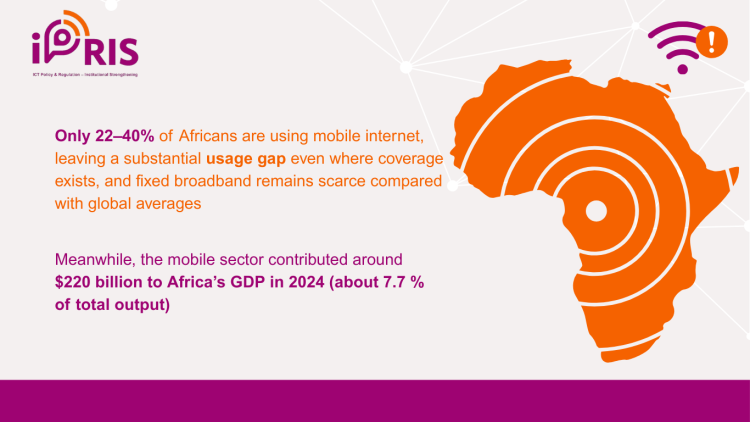
As part of iPRIS's structured peer-to-peer learning cycle, this session marked a turning point for the second Francophone cohort: the shift from learning to action. Following comprehensive training in Luxembourg in September 2025, these Francophone African telecom regulators reconvened in Benin to test their Change Initiatives (CIs) against on-the-ground realities, measure the progress achieved and consolidate the reforms underway.
The session was officially opened with addresses by H.E. Stéphane Mund, Ambassador of the European Union to Benin, the representative of the Ambassador of Luxembourg to Benin, and Dr Hervé C. Guèdègbé, Executive Secretary of ARCEP Benin. This high-level institutional framework set the tone for the week's ambition from the outset: positioning African regulators as drivers of the continent's digital transformation.
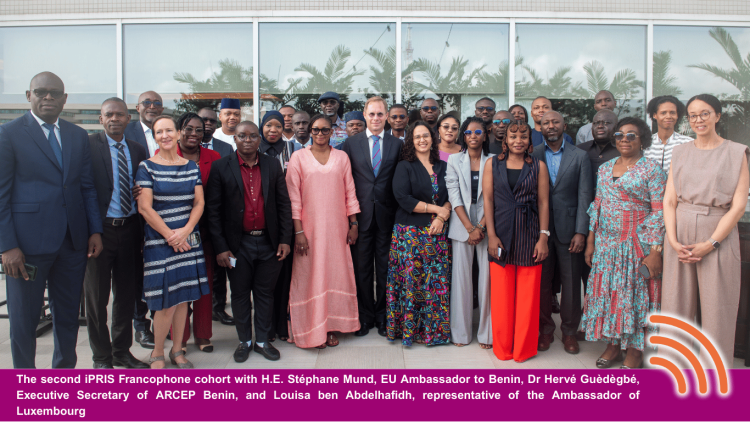
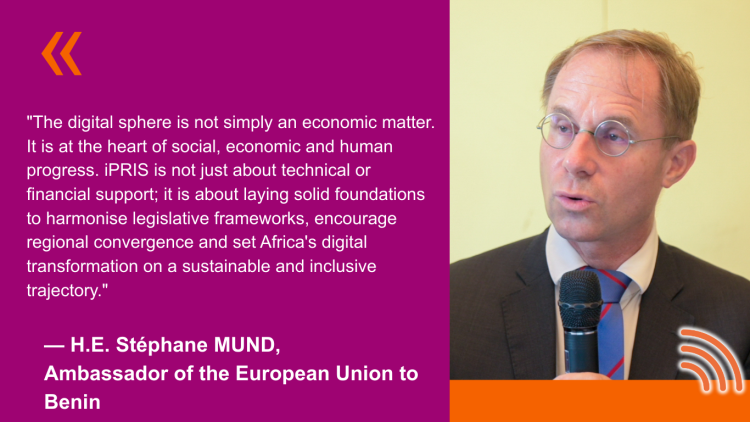
The morning of this first day was dedicated to presentations on the progress of the Change Initiatives led by each NRA. From competition regulation and spectrum management to 5G deployment, fibre optic infrastructure regulation and spectral interference detection, each regulator demonstrated measurable progress since the comprehensive training session in Europe. A highlight of the day was the spotlight on ARCEP Benin's achievements, including the announcement of the decision regulating tariffs in the electronic communications and digital sector, as well as the forthcoming framework for free WiFi zones. These measures illustrated the Beninese regulator's commitment to a more transparent, equitable and accessible market.
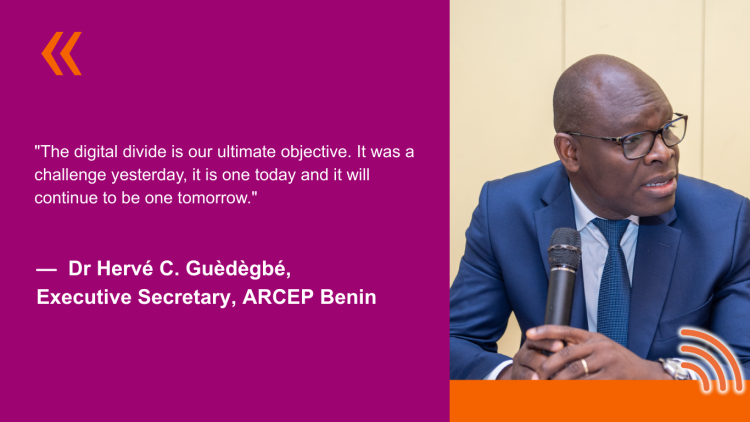
The day concluded with a visit to the ARCEP Benin technical centre in Hêvié, Calavi, where participants met with the executive secretariat of ARCEP to discuss the country's evolving approach to public internet access, including recent regulatory guidelines on WiFi zone operations. The regulatory framework underscores the importance of prior authorisation, quality of service, data protection and fair competition, commitments that illustrate how regulation can protect users while enabling affordable and equitable digital access.
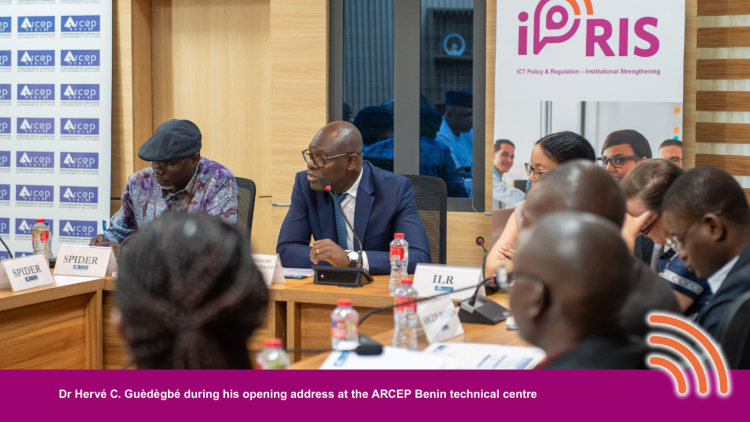
The second day was entirely devoted to dedicated Change Initiative meetings. Each national regulator worked in dedicated sessions with experts from WATRA, ARTAC, SPIDER, ILR and EACO to refine implementation strategies, identify risks and strengthen action plans. This discussion group format reflects the iPRIS methodology: iterative, structured support grounded in accountability. The exchanges enabled in-depth exploration of the challenges specific to each national context — budget constraints, institutional approval timelines, inter-agency coordination and access — while identifying cross-cutting solutions, good practices and shared visions among peers.
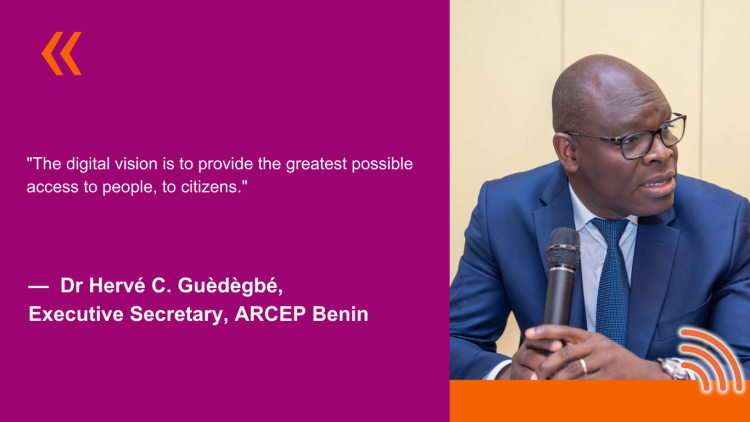
The day continued into the evening at the Embassy of Luxembourg in Benin, where participants were received at a special invitation. This institutional moment reaffirmed the support of European and African experts for strengthening the capacities of NRAs and promoting inclusive digital ecosystems.
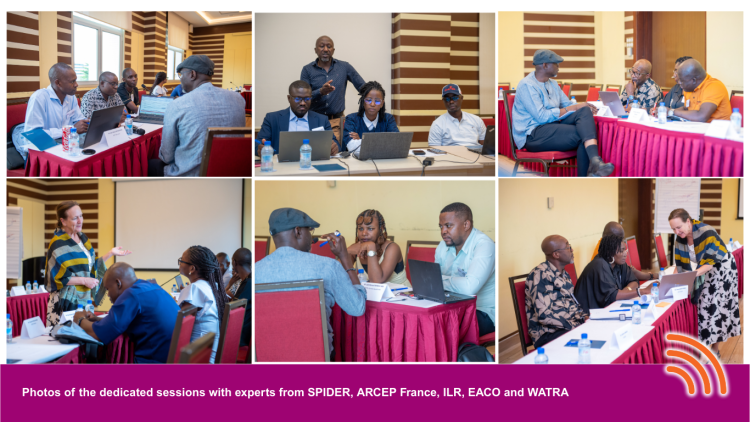
The third day offered African regulators an immersion in Benin's financial and digital innovation ecosystem, combined with capacity-building sessions on project management and institutional diversity.
The morning took place at the Embassy of Luxembourg, with presentations by two startups awarded through the LuxAid Challenge Fund: Global Optim Benin (GOBIWORLD), whose integrated mobile application digitalises and optimises the activities of Mobile Money agents to strengthen financial inclusion, and Media Soft Bénin, which facilitates the digitalisation of microfinance institution services for broader access to financial services, particularly for vulnerable populations.
Ms Livia Sossou, Senior Technical Adviser for the BeDigital programme, and Mr Gilles Da Costa, Senior Technical Adviser for the Inclusive and Innovative Finance programme, presented Benin's progress in financial inclusion. The financial inclusion rate, estimated at 87% in 2025, has now reached 90% within the WAEMU zone, driven by the adoption of the new banking law in 2024, which extends the scope of application to payment institutions, electronic money institutions and FinTechs.
The visit to the MTN Innovation Lab completed this immersion with a presentation of Cashless, a SaaS platform dedicated to managing employee benefits and professional expenses. These initiatives illustrate the dynamism of Benin's digital ecosystem and the synergies between regulation and innovation.
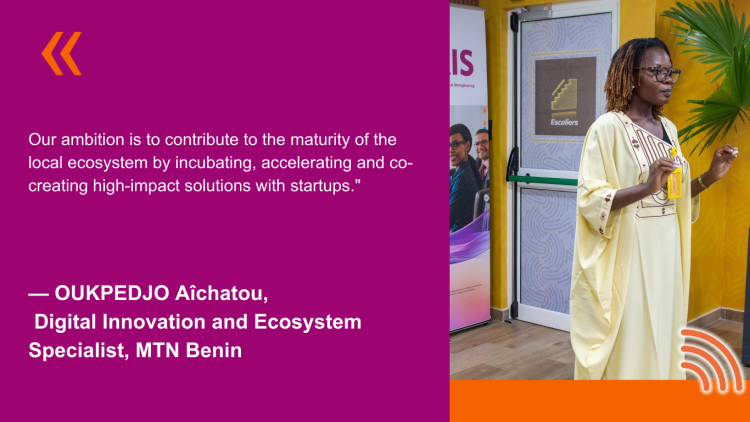
The afternoon opened with a session led by Cheikh Sadibou Sakho (SPIDER / Gaston Berger University) on diversity, equity and inclusion (DEI) in regulatory environments. The session emphasised that inclusion is not limited to infrastructure but also depends on social roles and gender, reinforcing the idea that public legitimacy and trust rest on inclusive leadership.
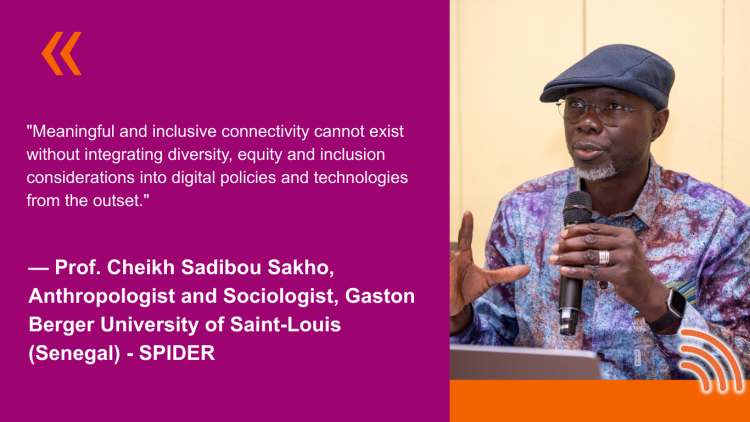
Read more about Prof. Sadibou’s insights on digital inclusion here
Malena Liedholm-Ndounou (SPIDER) led a session on project management and Monitoring, Evaluation, Accountability and Learning (MEAL), equipping regulators with practical tools to plan, monitor and evaluate the impact of their Change Initiatives. The session highlighted that the sustainability of reforms depends as much on project discipline as on technical expertise.
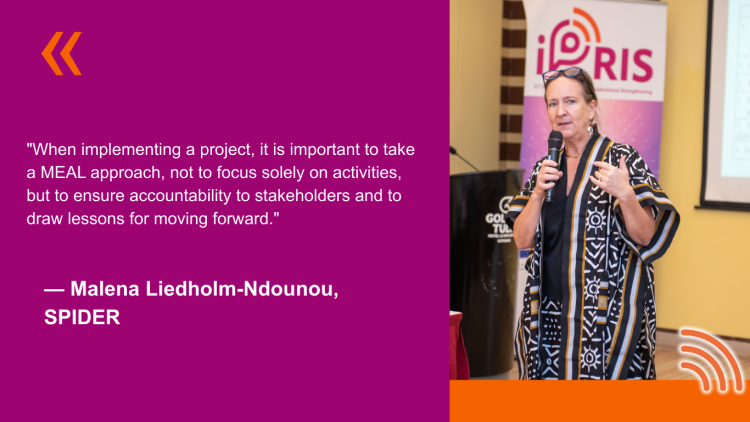
The session on tariff regulation, led by Antoine Samba (ARCEP France/FRATEL) and Tantely Jeans (ILR), also enabled participants to explore European regulatory frameworks on pricing and consumer protection in greater depth, a topic at the heart of several Change Initiatives in this second Francophone cohort.
The fourth and final day focused on consolidating the Change Initiatives and defining the way forward. Each NRA in the cohort presented their roadmap for the coming months, specifying key milestones, expected deliverables and monitoring mechanisms. The presentations demonstrated how far the CIs had progressed, moving from strategic design in Luxembourg last September to detailed action plans anchored in each country's institutional realities.
The session closed on a convivial note with a cultural excursion to Ouidah, a historic city in Benin. This shared moment strengthened bonds among participants, illustrating the spirit of collaboration and solidarity that characterises the iPRIS project.
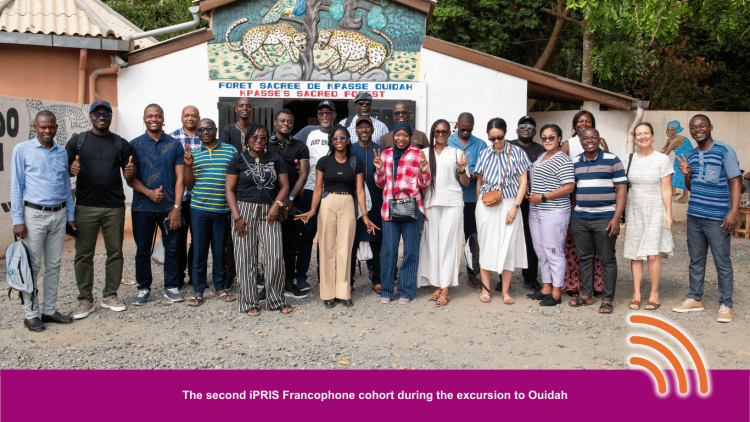
The follow-up session of the second Francophone cohort in Cotonou confirms the core mission of iPRIS: to support telecom regulators in implementing structural reforms, foster peer-to-peer learning and contribute to building more inclusive, innovative and sustainable digital environments across Africa. In four days, the second Francophone cohort demonstrated that structured peer-to-peer exchange accelerates the regulatory capacity of African institutions, from progress presentations to CI clinics, from fintech immersion to reflection on inclusive leadership.
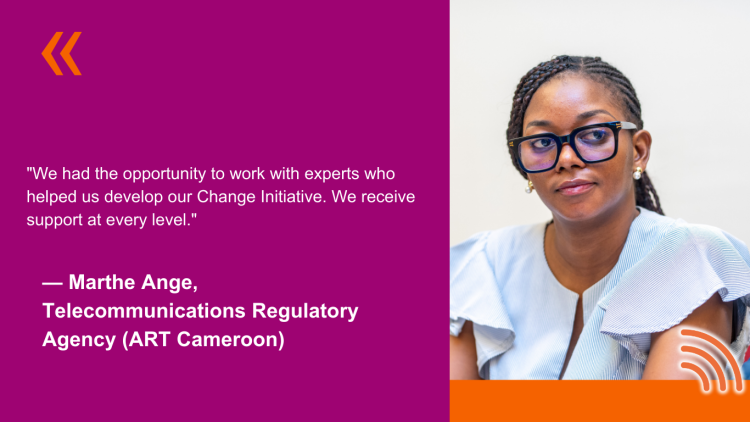
Since its launch in 2023, iPRIS has mobilised more than 200 telecom experts across 33 countries, reflecting a growing continental network of regulators who draw on shared expertise and coordinated regulatory action to shape resilient, forward-looking digital markets. The Cotonou session is not the end of the journey, but a milestone in iPRIS's ongoing commitment to African regulators — a commitment that transforms learning into reform and reform into lasting impact.
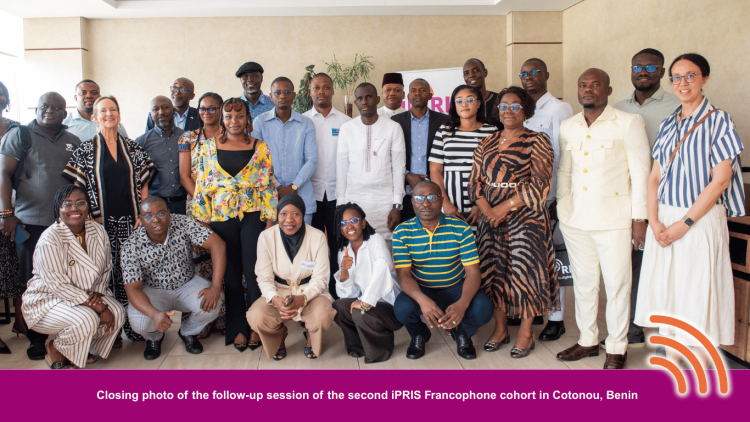
iPRIS is coordinated and implemented by SPIDER in strategic and technical partnership with the Swedish Post and Telecom Authority (PTS) and Institut luxembourgeois de régulation (ILR), as well as ARTAC, CRASA, EACO, and WATRA.
iPRIS is funded by the European Union, Sweden, and Luxembourg as part of the Team Europe Initiative “D4D for Digital Economy and Society in Sub-Saharan Africa” (Code: 001).
From 9 to 12 February 2026, the Regulatory Authority for Electronic Communications and Post of Benin (ARCEP Benin) will host the Africa round of the second Francophone cohort of the ICT Policy and Regulation – Institutional Strengthening (iPRIS) programme in Cotonou.
The meeting brings together African National Telecom Regulators, Regional Regulatory Organisations, alongside international collaborators to strengthen institutional capacity and advance inclusive digital transformation across Francophone Africa. Sub-Saharan Africa (SSA) faces major challenges in digital development, including underdeveloped digital infrastructure, limited access to affordable connectivity, a digital gender gap, limited skills for digitally enabled industries, and weak regulatory and policy environments. However, over the last few years, the region has made major advances in digital transformation, with hundreds of millions of people gaining access to the internet and productively using a wide variety of digital services, such as mobile payments and e-learning platforms (World Bank, 2024).
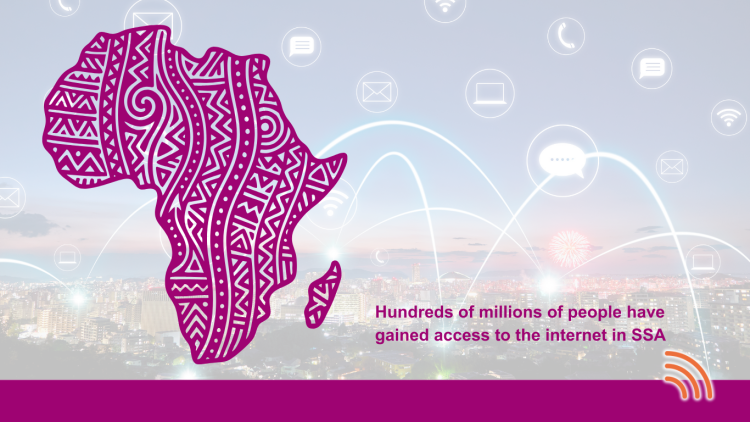
The Africa round of iPRIS’s Francophone cohort in Benin builds on knowledge-sharing sessions in Europe and moves toward implementation, tailoring reforms to local contexts and regional priorities.
Among the participating National Regulatory Authorities are the Regulatory Authority for Electronic Communications and Post of Benin (ARCEP Benin), the Regulatory and Control Agency for Telecommunications of Burundi (ARCT Burundi), the Telecommunications Regulatory Agency of Cameroon (ART Cameroon), the Telecommunications Regulatory Authority of Equatorial Guinea (ORTEL Equatorial Guinea), the Regulatory Authority for Electronic Communications and Post of Gabon (ARCEP Gabon), and the Regulatory Authority for Post and Telecommunications of Guinea (ARPT Guinea).
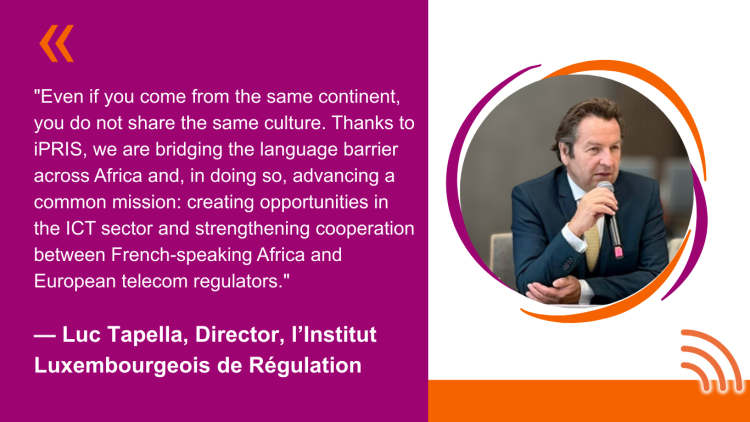
They will be joined by Regional Regulatory Organisations, including the West Africa Telecommunications Regulators Assembly (WATRA), the East African Communications Organisation (EACO), and the African Telecommunications Regulators Assembly for Central Africa (ARTAC).
The meeting will also include implementing partners such as the Luxembourg Institute of Regulation (ILR) and the Swedish Program for ICT in Developing Regions (SPIDER), with contributions from European collaborators including the Regulatory Authority for Electronic Communications and Post of France (ARCEP France).
This convening marks the second stage of the cohort’s journey in the iPRIS cycle, following its initial phase in Luxembourg in September 2025. The follow‑up phase in Cotonou, Benin, will build on the cohort’s initial learning round in Luxembourg, shifting from exposure to Africa‑based implementation. By prioritizing practical reforms, the meeting reinforces ICT regulation as a driver of digital transformation, strengthens regional cooperation among Francophone regulators, and deepens institutional capacity‑building to ensure reliable and inclusive digital economies across Sub Saharan Africa, enabling regulators to implement lessons to local realities and implement concrete reforms.
Read more about the regulator’s time in Luxembourg here.
iPRIS is an EU‑supported initiative designed to strengthen ICT policy and regulatory frameworks across Sub‑Saharan Africa. Coordinated by SPIDER in partnership with the Swedish Post and Telecom Authority (PTS) and the Institut luxembourgeois de régulation (ILR), the programme is part of the Team Europe Initiative Digital for Development (D4D) and emphasises peer learning, institutional reform, and regulator‑led Change Initiatives that deliver measurable impact. In Francophone Africa, the urgency of coordinated regulatory action is clear: over 60% of Africa’s population still lacks access to the internet, according to the African Telecommunications Union (ATU, 2024). This digital divide shows why the Benin meeting is critical, as regulators work to expand affordable connectivity and strengthen institutional capacity for inclusive digital transformation.
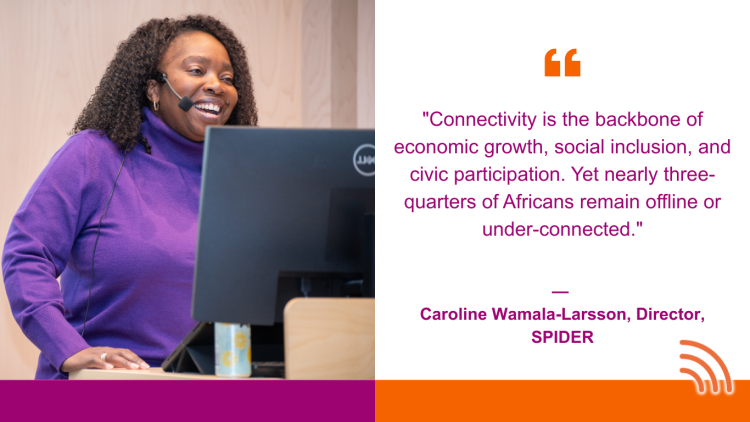
iPRIS helps bridge the digital divide by enhancing inclusive, meaningful digital connectivity. It does so by boosting the capacities of African telecom regulators through peer‑to‑peer learning with African and European counterparts, emphasising institutional reform and practical implementation as the basis for sustainable digital economies. Strengthening digital regulation is directly tied to the Sustainable Development Goals, as inclusive connectivity supports quality education, economic growth, innovation, and stronger partnerships.
Strategic Objectives of the Benin Meeting
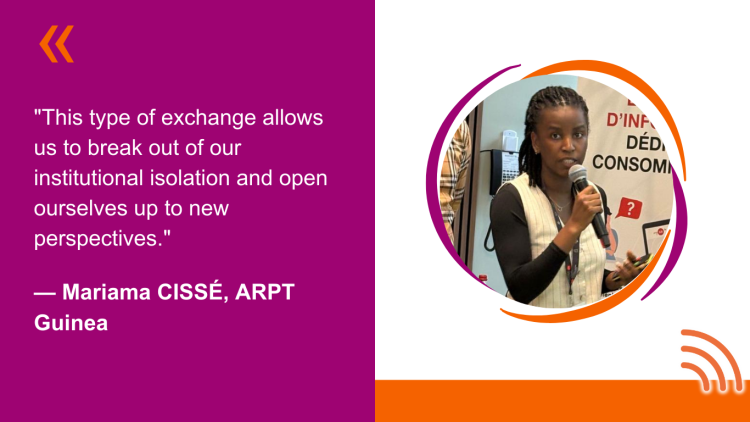
Since the project was launched in 2023, iPRIS has engaged 24 National Regulatory Authorities (NRAs) and 4 Regional Regulatory Organisations (RROs), supporting more than 20 measurable Change Initiatives across spectrum reform, cybersecurity frameworks, roaming regulations, and satellite‑to‑device services. These initiatives demonstrate how peer learning translates into concrete reforms that expand affordable connectivity, strengthen consumer protection, and prepare regulators for emerging technologies.
The Africa round in Cotonou, Benin, is not the end of the journey but part of iPRIS’s continued engagement with African regulators. Continuous partnership beyond this meeting will be essential to ensure that the lessons learned translate into long-term reforms, stronger institutions, and more inclusive digital economies across the region. As the cohort advances its Change Initiatives and deepens regional cooperation, iPRIS remains committed to supporting regulators in adapting to emerging technologies and cross‑border challenges.
For updates and highlights on the programme’s progress, visit the iPRIS LikedIn Page.
Watch highlight videos of the iPRIS videos here.
iPRIS is coordinated and implemented by SPIDER in strategic and technical partnership with the Swedish Post and Telecom Authority (PTS) and Institut luxembourgeois de régulation (ILR), as well as ARTAC, CRASA, EACO, and WATRA.
iPRIS is funded by the European Union, Sweden, and Luxembourg as part of the Team Europe Initiative “D4D for Digital Economy and Society in Sub-Saharan Africa” (Code: 001).
The wrap-up session of the fourth iPRIS cohort on the 16th of December 2025 marked the end of a one-year institutional-strengthening cycle for the participating National Regulatory Authorities (NRAs). The moment was very special: as the cohort finished its cycle, iPRIS itself celebrated two years of implementation, two years of assisting regulators to go from learning to delivery, and from ambition to institutional change.
The teams of regulators from Kenya, Namibia, Zimbabwe, Liberia, South Sudan, and Ghana were gathered together. It was a wrap-up session and a reflection point. The session revealed the capacity regulators achieved in very complex institutional settings, how they worked around constraints, and the iPRIS methodology's practical value in capacity building, translated into concrete regulatory outcomes. The team had initially met in Namibia in early 2025 to discuss progress on change initiatives (CIs), after their first round in the iPRIS cycle in Sweden in November 2024.
Read about the cohort’s discussions and activities in Namibia here
CIs, the unique activities in the regulator’s scope that each country had decided to work on, were the point of discussion. The focus was on core regulatory functions that are central to resilient digital ecosystems: the management of numbering resources, the governance of spectrum, SIM registration and KYC enforcement, and the institutional processes for consultation and approval.
There was a difference in the country context, but a common pattern emerged. The teams were able to:
In several cases, draft guidelines and frameworks were completed and internally reviewed, with final approvals and publication pending institutional processes beyond the teams’ direct control. Rather than signalling stalled progress, these realities underscored a critical insight of the cohort: sustainable regulatory reform is as much about navigating governance systems as it is about technical design.
Kenya and Zimbabwe anchored their Change Initiatives in the reform of national numbering frameworks to ensure readiness for evolving technologies and services.
Kenya focused on enhancing the telecommunications numbering resource administration and management framework, aiming to improve efficiency, transparency, and long-term sustainability in numbering allocation. The initiative included revising regulatory frameworks, clarifying administrative procedures, and engaging stakeholders to ensure alignment with market needs and institutional approval processes.
Zimbabwe’s Change Initiative is centred on the revision of the national numbering plan to include IoT and machine-to-machine (M2M) numbering. The team conducted a gap analysis and developed draft implementation guidance, informed by consultations with operators and regional peers. The work positioned the regulator to anticipate future services better while highlighting the importance of targeted, technically informed stakeholder engagement.
Namibia’s Change Initiative focused on developing national cybersecurity incident management guidelines. The work addressed the need for clearer roles, coordination mechanisms, and response procedures in the event of cyber incidents. Through internal coordination and structured planning, the team advanced draft guidelines while navigating institutional approval processes, reinforcing the importance of preparedness as digital services expand.
Liberia’s team focused on FM spectrum management, responding to interference challenges, unauthorised broadcasters, and outdated regulatory provisions. Despite leadership changes within the NRA during the project period, the team completed a comprehensive regulatory review, internal validation workshops, and stakeholder engagement, including direct discussions with radio stations. While the final publication of the revised guidelines is pending formal approval, the initiative has already strengthened internal coordination and built a shared institutional understanding of spectrum governance challenges.
South Sudan’s Change Initiative focused on enforcing guidelines on SIM card registration and Know Your Customer (KYC) requirements to strengthen sector integrity and consumer protection. The team developed draft enforcement guidelines, conducted stakeholder consultations with mobile network operators and relevant institutions, and identified critical dependencies with civil registration authorities, security agencies, and law enforcement bodies. The initiative underscored the importance of inter-agency coordination, data protection considerations, and sustained leadership support. While final approvals and nationwide rollout are forthcoming, the regulatory foundations for more consistent SIM registration enforcement are now in place.
Ghana’s Change Initiative addressed digital inclusion and consumer protection for residents of border towns, with a specific focus on educating users about preventing automatic roaming. The initiative responded to persistent challenges faced by border communities, including unexpected roaming charges and limited awareness of consumer rights. Through structured planning, internal coordination, and targeted stakeholder engagement, the team advanced education-focused interventions while applying iPRIS project management tools to strengthen delivery and sustainability beyond the cohort cycle.
Ghana’s contribution emphasised institutional strengthening rather than a single technical reform area. The team reflected on how the iPRIS project management tools, clear objectives, structured workplans, sequencing of approvals, and risk management, supported more disciplined internal coordination and delivery. The experience highlighted the value of change management, cross-departmental collaboration, and leadership engagement in sustaining reform momentum beyond the formal iPRIS cycle.
Across all presentations, several cross-cutting lessons stood out:
These lessons reflect the core premise of iPRIS: that regulatory effectiveness depends as much on institutional capability and process as on technical expertise.
As the fourth cohort concludes its cycle, the focus shifts from completion to continuity. Several teams are advancing toward publication, validation workshops, and implementation phases, building on the structures established during iPRIS. For iPRIS, the wrap-up session also marked two years of supporting various regulators in strengthening institutions from within through practical learning, peer exchange, and structured change initiatives. The fourth cohort’s experience demonstrates that even within constrained environments, regulators can deliver meaningful reform when equipped with the right tools, support, and networks. As iPRIS enters its next phase with ongoing cohorts, the achievements and lessons of this cohort provide a strong foundation for deeper impact, regional learning, and sustained institutional change across the ICT regulatory landscape.
iPRIS is coordinated and implemented by SPIDER in strategic and technical partnership with the Swedish Post and Telecom Authority (PTS) and Institut luxembourgeois de régulation (ILR), as well as ARTAC, CRASA, EACO, and WATRA.
iPRIS is funded by the European Union, Sweden, and Luxembourg as part of the Team Europe Initiative “D4D for Digital Economy and Society in Sub-Saharan Africa” (Code: 001).
On November 28th, alongside the backdrop of the iPRIS round, a collaborative workshop in Stockholm brought together representatives from the Communications Regulators' Association of Southern Africa (CRASA), SPIDER, and Visionary Analytics. The workshop participants included Bengt G. Mölleryd and Ulf Larsson from SPIDER, Brian K. Mwansa, Acting Executive Secretary of CRASA, and Vaida Gineikytė-Kanclerė and Audronė Sadauskaitė from Visionary Analytics, with additional input from Jonas Antanavičius, who participated online. They intended to work together on a critical pre-study to help develop CRASA's regional data collection and analysis tool. The session indicated a major advancement in the direction of the regulation, based on evidence from the Southern Africa region. This area is increasingly important given the rapid changes in technology, markets, and cross-border digital services that regulators encounter. CRASA's goal is to provide its member National Regulatory Authorities (NRAs) with the necessary insights to make better decisions, advance benchmarking, and increase cooperation across the region through the establishment of a unified data approach.
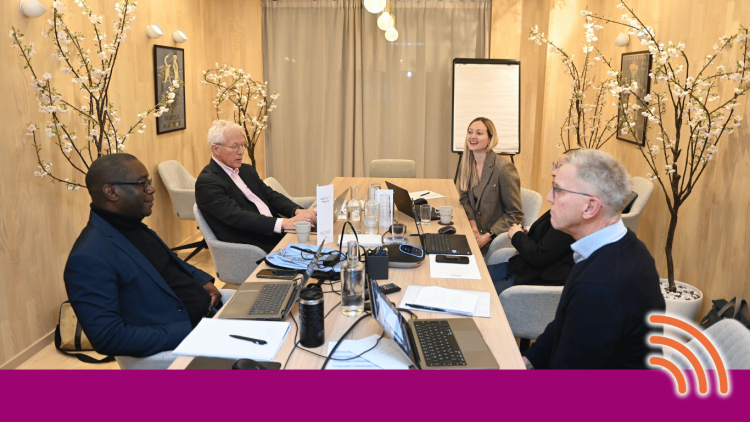
The workshop outlined the pre-study rationale, scope, and objectives, making it possible for all participants to understand the project's expected outcomes and planned activities. Participants reviewed the methodology and fact-finding approach, which included the main research questions and working assumptions that would guide the study. Additionally, more of the conversation concerned the creation of indicators and a harmonisation index, two major elements for building a strong regional dataset. The group went on to discuss the preliminary concept of a data collection and analysis tool and considered ensuring the tool's significance and future scalability for the member states of CRASA.
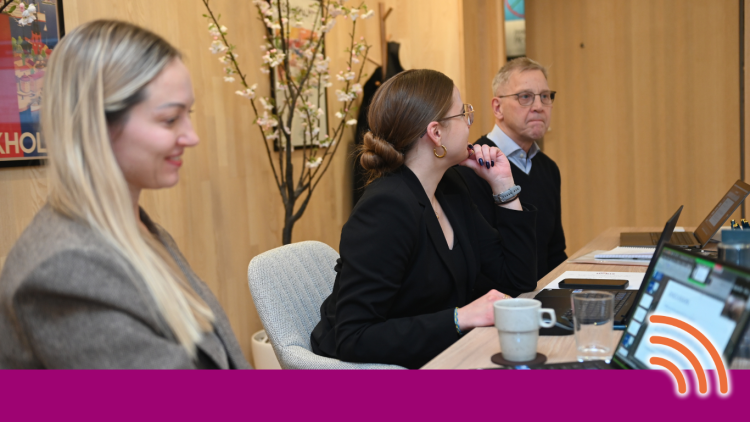
The gathering concluded with the articulation of specific next steps: ratifying key agreements, synchronising timelines, and gearing up for the next workshop, where the basic insights gained will be further processed into practical recommendations. These joint discussions underscore the power of actively involving multiple stakeholders by gathering and leveraging regional leadership, technical expertise, and institutional partners to create instruments that support an ecosystem of regulation that is effective, transparent, and ready for the future across sub-Saharan Africa.
iPRIS is coordinated and implemented by SPIDER in strategic and technical partnership with the Swedish Post and Telecom Authority (PTS) and Institut luxembourgeois de régulation (ILR), as well as ARTAC, CRASA, EACO, and WATRA.
iPRIS is funded by the European Union, Sweden, and Luxembourg as part of the Team Europe Initiative “D4D for Digital Economy and Society in Sub-Saharan Africa” (Code: 001).
The seventh iPRIS cohort concluded its first round in the project’s cycle, with three intensive weeks in Stockholm, bringing together African National Regulatory Authorities (NRAs), Regional Regulatory Organisations (RROs), implementing partners (SPIDER and PTS), and European partners to advance the development of strategic, impactful Change Initiatives (CIs). The cycle combined institutional learning, practical regulatory insights and hands-on problem-solving to strengthen regulatory capacity and accelerate Africa’s digital transformation. The NRAs included telecom and ICT experts from the National Communications Authority (NCA Ghana), Lesotho Communications Authority (LCA), Botswana Communications Regulatory Authority (BOCRA), Public Utilities Regulatory Authority (PURA The Gambia), Communications Authority (CA Kenya), and Malawi Communications Regulatory Authority (MACRA). These professionals were joined by their respective RROs, who support them during the entire period of implementing their CIs, from WATRA, EACO, and CRASA. This cohort’s successful first round marks a significant milestone, as iPRIS enters its second year, bringing together African and European telecom experts to advance the ICT landscape in sub-Saharan Africa.
Across the sessions, various emerging issues were identified, including the fact that 93 million women in Sub-Saharan Africa did not use mobile phones, underscoring the significance of progress and the potential of telecom regulatory advancement for the African continent. According to GSMA, around 885 million women in low- and middle-income countries remain unconnected to mobile internet, many of them in Sub-Saharan Africa. Connecting the women and other marginalised groups can bring significant social and economic benefits. Digital inclusion gives women access to various resources such as education, health information, financial services, and markets; it not only uplifts micro-enterprises but also enhances household income, provides financial independence to women, and supports community development. From a macro perspective, reducing the digital gap between males and females might have significant benefits, including higher GDP growth and larger digital-economy revenue.
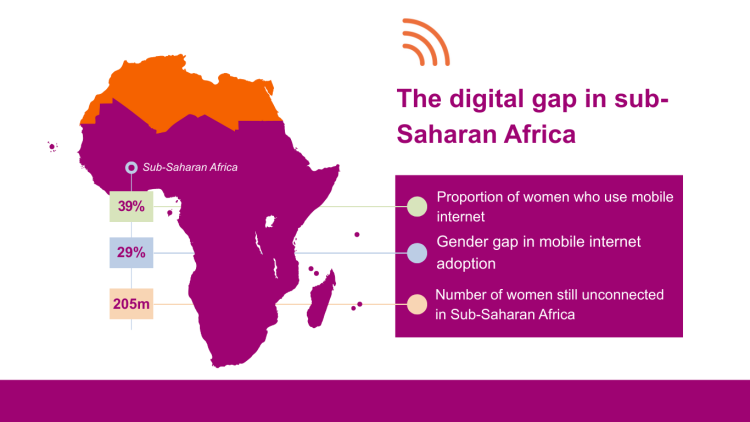
These numbers indicate the need to prioritise the development of telecom regulation in sub-Saharan Africa. iPRIS is doing that by uniting regulators, regional bodies, and experts into a network that is making policies focused on inclusion, affordability, infrastructure, and equity. iPRIS, through its cohort-based workshops and Change Initiatives, is giving the institutional and regulatory basis needed to formulate strategies that will turn connectivity into real and meaningful access and will realise the potential social and economic impact across Africa.
This round started with a very strong focus on building a common understanding of regulatory shifts, institutional building, and the aim of the Change Initiatives. The regulators shared their national CIs, which included spectrum roadmaps, community networks, consumer protection, emerging technologies, and satellite licensing, among others. Through guided peer review and expert input, the participants refined their initial problem statements and specified the national problems their CIs plan to solve. It was a pivotal first day, as CIs are the cornerstone of iPRIS, representing country-specific issues that enhance the telecom landscape in the participating sub-Saharan countries and regions.
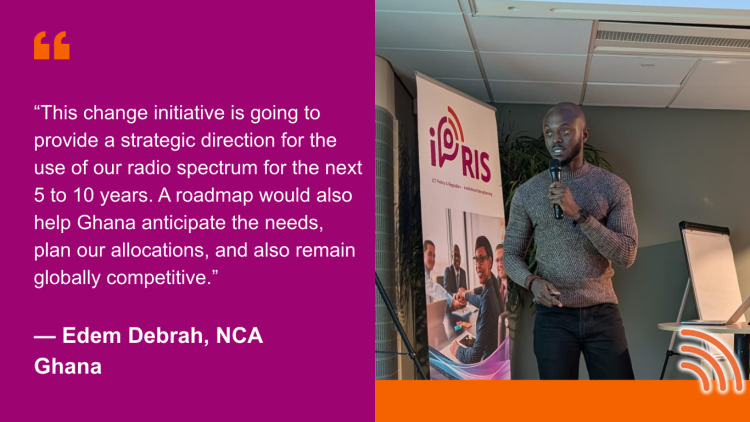
The Swedish Post and Telecom Authority (PTS) hosted sessions that extensively examined the issues of regulatory independence, market supervision, broadband planning and secure communications. Participants discussed the evolution of the market in Sweden from a less competitive, monopoly-type situation to a more consumer-focused market. The lessons they learned were important because they can be applied to certain African regulatory contexts. The discussions of the week also included topics such as user protection, accessibility, numbering systems, and inclusive digital policies; thus, the need for citizen-centric regulation was reiterated. The first week with the cohort strengthened their CIs with a strong analytical basis and gave them a clear picture of how regulatory frameworks can enable equitable digital markets.
Read more about the week 1 sessions here
In the second week, the spotlight shifted from basic concepts to the practical aspects of telecom regulation. The participants took part in expert discussions to further polish their CIs, stress-test their assumptions, and determine the data requirements. The week had one major theme: meaningful access. SPIDER led these discussions, and the participants took a step further and challenged the widespread assumption that if the network covers a location, it is connecting the users. They discussed affordability, device access, digital literacy, electricity supply, safety concerns, and cultural factors as barriers. The gender digital divide was a major issue, underscoring the critical importance of equity-driven policies for women and other marginalised groups.
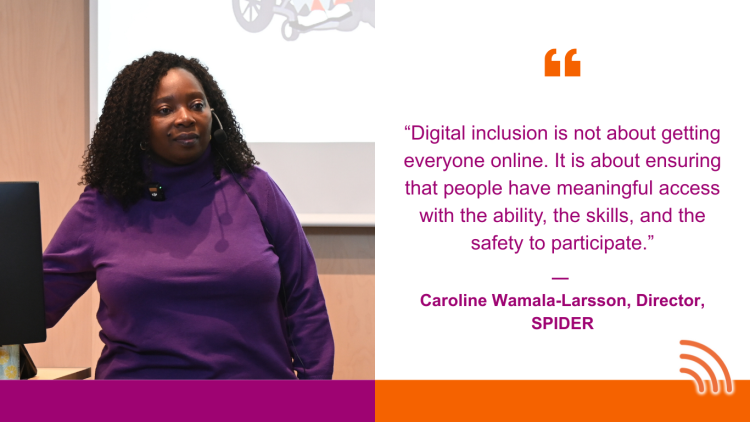
The cohort also reviewed the role of sex-disaggregated data, human-centered design, and regulatory flexibility to support vulnerable populations. By the end of the second week, regulators had changed their perspective on inclusion - not just in terms of the infrastructure but also in terms of the entire ecosystem that has to be in place to allow real access to the digital world.
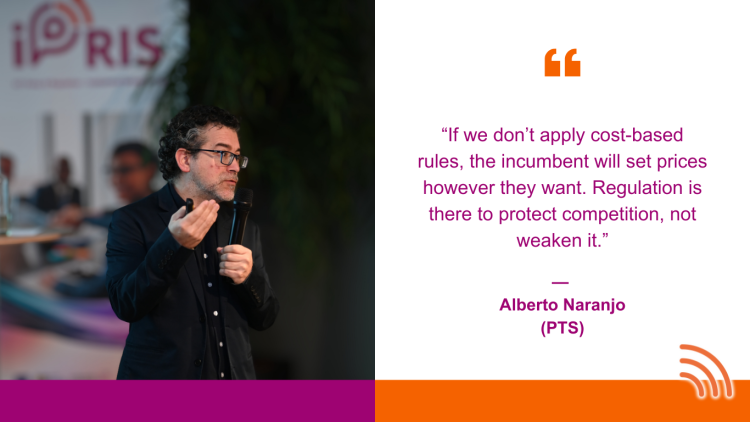
The discussions also revolved around the regulation of competition and the realities in African markets, the differences between European approaches and local market dynamics, the disadvantages of prepaid usage, and trends in smartphone adoption in African markets. Later in the week, participants' immersion in activities, such as a visit to Ericsson, exposed them to advanced technologies, including satellite connectivity, fixed-wireless access, network slicing, and enterprise-grade solutions. Lately, the other sessions tackled project management, monitoring, evaluation, accountability, and learning (MEAL). This session featured the unpacking of future Change Initiatives that would have an impact and the engagement of stakeholders.
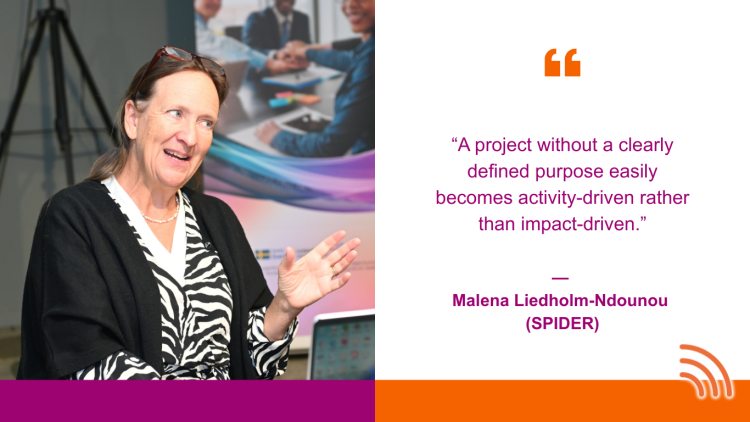
Read more about week 2 undertakings here
The third week marked a significant milestone in this iPRIS round, focusing on consolidating CIs, conducting expert consultations, and planning for the future. On Monday, regulators worked with European experts and RROs to refine the goals, activities, and feasibility aspects which were to be presented in their final “Way Forward” presentation later in the week. These intensive sessions not only reinforced the technical and institutional foundation of each CI but also the alignment with national priorities and the iPRIS framework in a more extensive way. Tuesday started with a presentation by Forsway Scandinavia, given by Anders Brandter, which provided participants with information on satellite-based connectivity, hybrid access models, and innovations for underserved areas.
Anders highlighted that “Digital inclusion depends on technology, but also on policy leadership. Without regulatory support, innovative solutions cannot scale.”
Later in the day, a panel discussion with WATRA, CRASA and EACO brought up the issue of regional cooperation being a very important factor for harmonised regulation and smooth cross-border exchanges. The final project management sessions provided intensive facilitation for the participants, who then translated their CIs into action plans using the tools applied. The regulators had their drafts of the ‘Way Forward’ session submitted and devoted the last part of the day to polishing the team presentations. The last day was solely focused on the ‘Way Forward’ CI presentations. The session underscored how far each CI had progressed, moving from conceptual framing in Week 1 to detailed, context-tailored plans ready for implementation. This concluded with certificate distribution, closing remarks from the organisers, and a final evaluation session that captured participant feedback and lessons learned.
Here are some snapshots from the final week sessions:
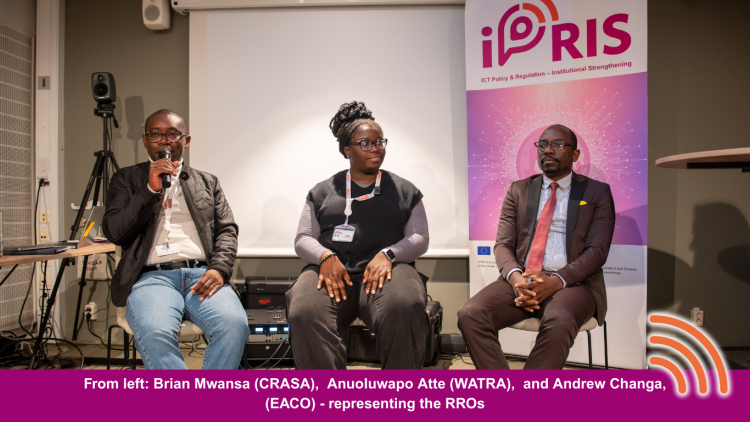
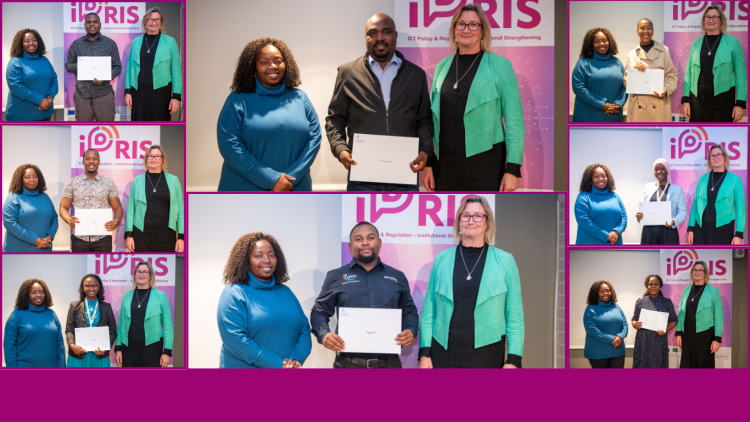

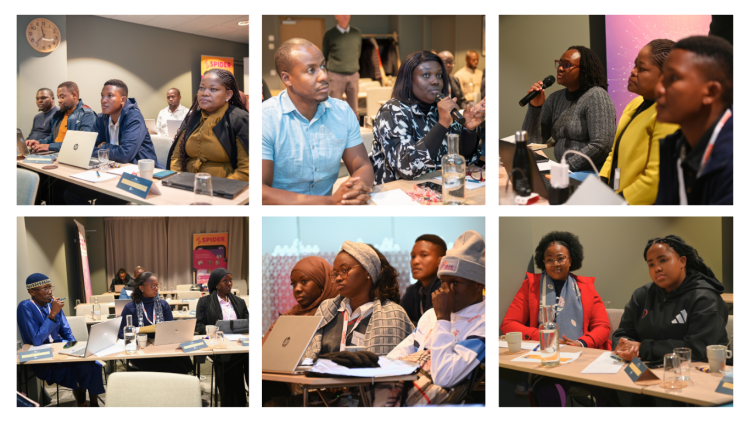
Over the three weeks, the seventh iPRIS cohort made substantial progress, from foundational learning to practical strategy design and, finally, to clear national roadmaps for transformative Change Initiatives. This first round of the iPRIS cycle for the cohort strengthened regulatory dialogue among African NRAs, RROs, and European partners, reinforcing the shared mission of expanding meaningful, inclusive, and future-ready digital access across the continent.
With their Way Forward plans now in place, participants move confidently toward their second iPRIS round in Ghana in March 2026, prepared to drive regulatory reform, enhance institutional performance and contribute to Africa’s broader digital development agenda.
iPRIS is coordinated and implemented by SPIDER in strategic and technical partnership with the Swedish Post and Telecom Authority (PTS) and Institut luxembourgeois de régulation (ILR), as well as ARTAC, CRASA, EACO, and WATRA.
iPRIS is funded by the European Union, Sweden, and Luxembourg as part of the Team Europe Initiative “D4D for Digital Economy and Society in Sub-Saharan Africa” (Code: 001).
The iPRIS 7th cohort's second week in Stockholm clearly showed the programme's transition from basic systems thinking to regulatory problem-solving in practice. During Week 1, the baseline concepts were established; meanwhile, regulators will continue engaging with the SPIDER, the PTS experts, and the Regional Regulatory Organizations (RROs) - WATRA, EACO, and CRASA. Week 2 was mainly focused on participants' Change Initiatives (CIs), and the regulators were given the chance to take home practical tools and frameworks that could be adjusted to suit African contexts. The National Communications Authority (NCA Ghana), Lesotho Communications Authority (LCA), Botswana Communications Regulatory Authority (BOCRA), Public Utilities Regulatory Authority (PURA The Gambia), Communications Authority (CA Kenya), and Malawi Communications Regulatory Authority (MACRA) are the Sub-Saharan African countries included in this seventh cohort.
On Monday, the teams worked exclusively with RROs, SPIDER, and PTS experts in closed sessions to better define their problems, verify their assumptions, and prepare their evidence needs for the technical sessions that would follow. These closed clinics were the foundation for the week’s technical exchanges and ensured that participants could apply the lessons directly to the CIs.
Below are some highlights from the sessions:
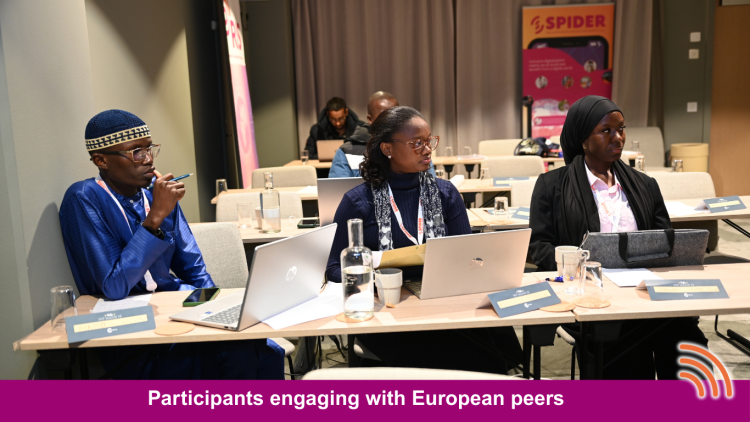
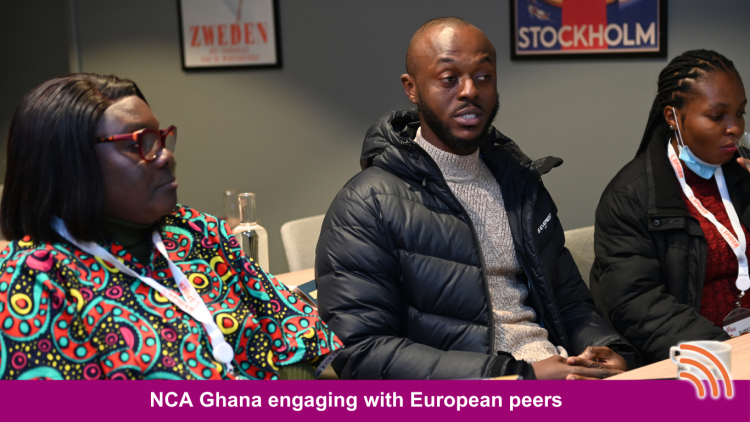
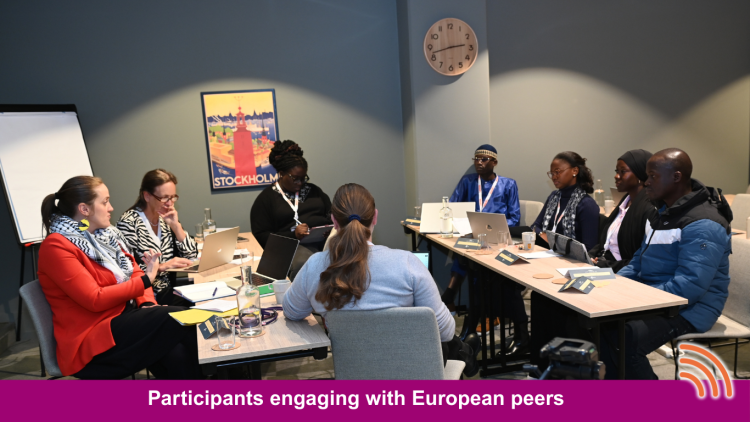
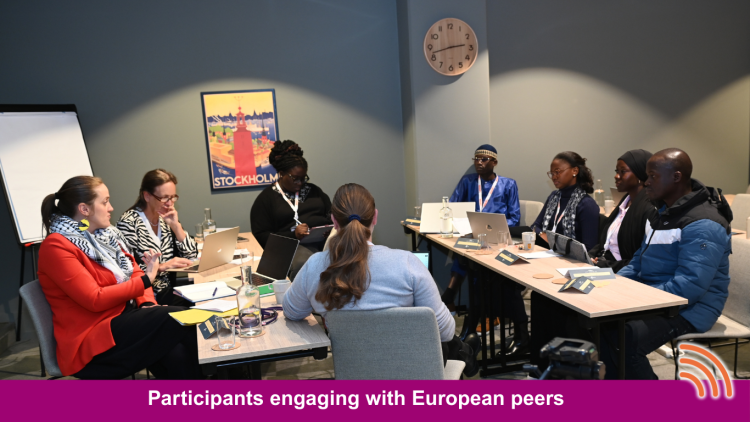
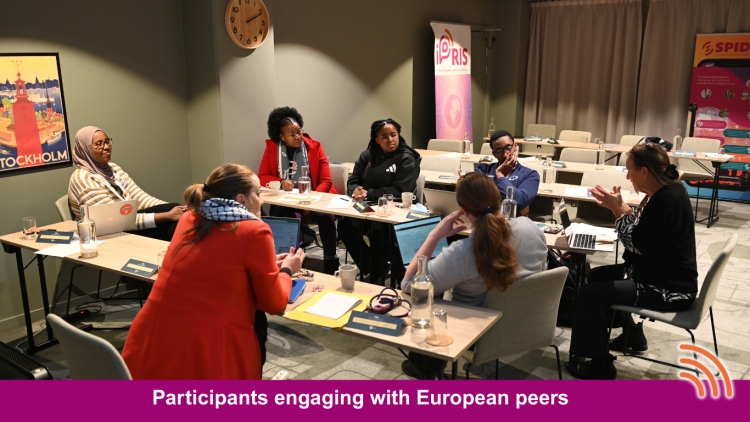
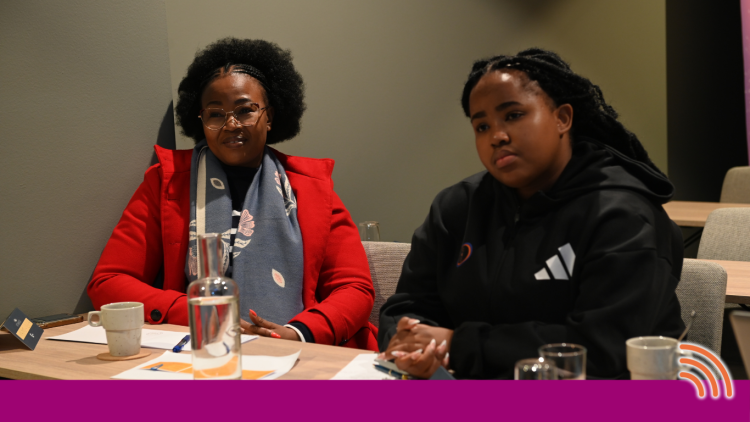
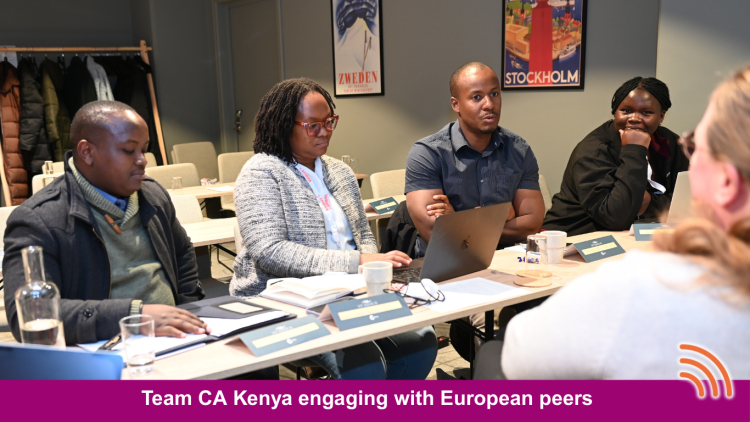
Moving from “universal” to “meaningful” access
At Stockholm University’s Department of Computer and Systems Sciences (DSV), the participants were given a warm welcome into Sweden’s academic and policy ecosystem. Caroline Wamala Larsson and Malena Liedholm-Ndounou from SPIDER transformed the concept of access by taking the discussion beyond infrastructure and connectivity. The presenters clarified the distinction between having coverage and having connectivity that was genuinely useful in people's lives. They pointed out that, although coverage had grown in many areas, truly meaningful access required a stable power supply, a budget mobile phone, technical literacy, personal safety, appropriate content, and cultural alignment, without which the connection remained low.
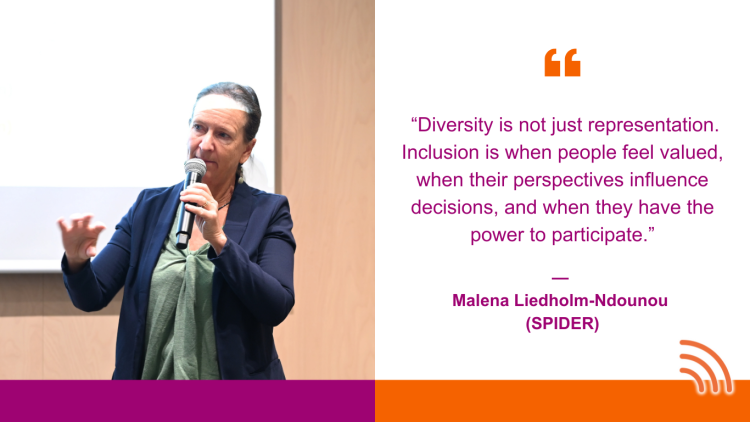
The hard numbers: Coverage vs. usage reality
The group examined recent GSMA statistics indicating that Sub-Saharan Africa had a usage gap of around 61%, equivalent to approximately 710 million people in the network coverage area who were not regularly accessing mobile internet. This gap was not due to the lack of towers but rather to a variety of factors, such as affordability, literacy, relevance, and safety.
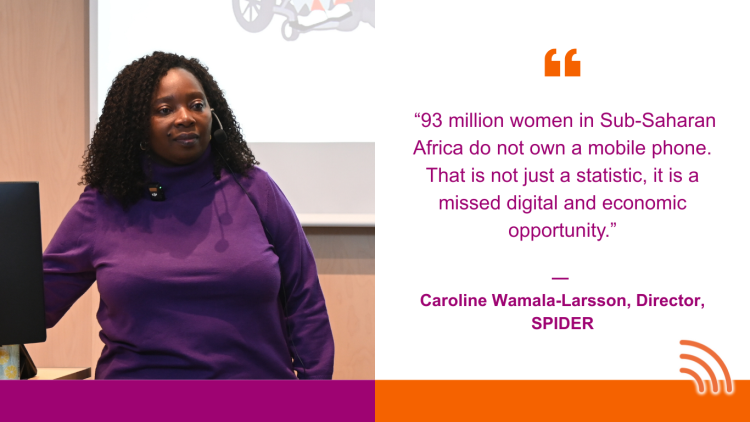
The moderators also mentioned gender-related trends: the GSMA data referenced in the discussion showed that 93 million women in Sub-Saharan Africa did not use mobile phones. They also pointed out that the network covered 215 million women but did not have access to the internet through mobile phones, demonstrating the compounded effect of factors such as ownership, freedom, and social barriers on women’s digital engagement.
Not just equality but equity
The sessions used easy-to-understand analogies, the apple tree, and a “game of life” depiction to emphasize that giving equal inputs does not always result in equal outcomes. Regulators were prompted to consider equity from the standpoint not just of treating everyone equally, but of creating different interventions so that those starting from disadvantaged positions can reach the same outcomes as others. This perspective called for the active participation of the government, civil society, and private-sector partners to confront and eliminate structural barriers together.
What is the reason for the gap in usage?
The participants grouped these barriers that were overlapping:
These findings shifted the discussion from a monolithic infrastructure concern to multidimensional policy responses that integrated USAF investments with social policy, education, language, and safety measures.
The session on the competition regulations with PTS specialists Alberto Naranjo and Björn Backgård quickly shifted from the theoretical to the practical in the African markets. The long formulas were no longer the subject of discussion but rather the main question for the consumer, the regulator, and the operator, facing completely different conditions from those in Europe. Participants compared two approaches to regulation: Europe's price-based and cost-based regulation, and the most powerful insights came from the audience itself.
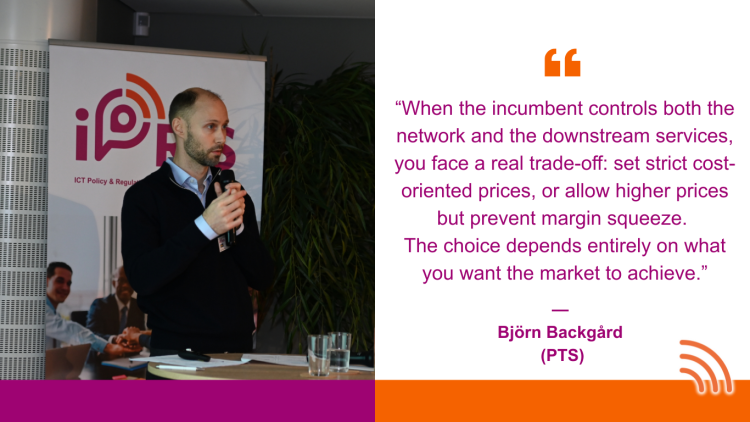
The main factors that influenced the conversation:
Smartphone use is going to skyrocket.
Sub-Saharan Africa is going to move from 54% to more than 80% smartphone adoption among mobile subscribers. A young population, affordability programs, and the availability of digital services are the main reasons for this change. The competition and the market access will be totally different.
Mobile Number Portability is not a big deal when every user has at least two SIM cards.
Consumers have been switching operators by changing SIMs, as many regulators have reported. Nowadays, the interconnection rates are so low that the incentive to be “on-net” is no longer there, so there is not much urgency for MNP in a lot of markets.
Prepaid is the king — and he changes the rules of the game.
In markets where prepaid is the leading payment method, customers are quick to reward excellent service and just as quick to punish poor quality. However, this also indicates underlying problems, such as the low number of credit users.
Roaming is still a tricky situation.
Although there are regional regulations in SADC and ECOWAS, operators still resist lowering wholesale rates to a great extent. Wi-Fi and apps like WhatsApp are helping users avoid roaming charges, even though they still incur them.

A common conclusion
The nature of the competition, in effect, is not determined by the number of operators but rather by the presence of genuine choice, fair prices, and incentives that align with the purchasing behavior of African consumers.
On the third day, the group moved to the heart of Sweden's innovation scene - the Kista headquarters of Ericsson. The day began with the welcome of Peter Olusoji Ogundele, who presented on market trends, regulatory priorities, and next-generation technologies. A Global Spectrum Update explained how the demand, licensing, and coordination in the spectrum are changing globally - a must-have background for Change Initiatives that require good spectrum planning. Afterwards, a survey of the satellite market revealed the emergence of LEO constellations and the impact of new players on rural areas' coverage, competition, and prices in Africa.
During one of the sessions, which were very forward-looking, EU AI policy and enterprise AI compliance were reviewed, and the interconnection among telecom infrastructure, data governance, and emerging AI-driven services was highlighted. After that, the Ericsson team introduced network security from a holistic perspective, highlighting the three aspects of resilience, threat detection, and the changing responsibilities of critical infrastructure operators.
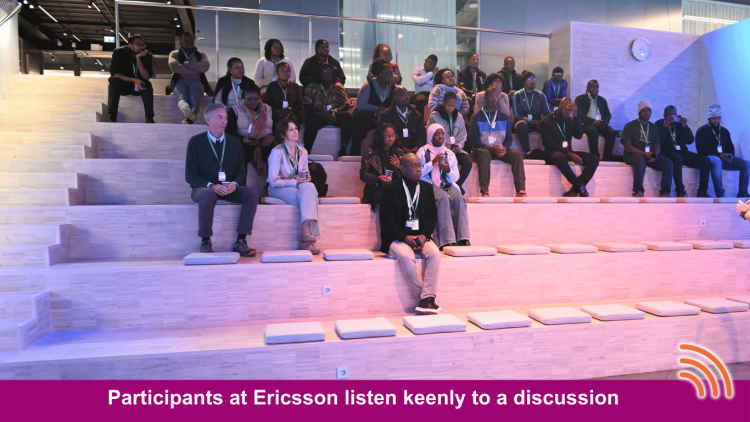
In the afternoon, the group toured the Ericsson Imagine Studio, participating in hands-on demonstrations of Digital Twin technologies, XR applications, network slicing, enterprise solutions, FWA deployments, and advanced Quality of Service tools. They thus saw the abstract concepts transformed into tangible solutions.
The day concluded with a multistakeholder panel discussion among Ericsson, Telia and PTS, where the participants were allowed to query the industry experts about the factors that encourage investment, the competition so far in the market, and its future dynamics. Day 3 was an experience paralleled by none in the whole week - a hands-on, high-impact encounter with the technologies and the ruling industry perspectives molding the communication in Africa.
Day 4 merged the two most essential factors of this ipRIS cycle: efficient project management and the adoption of the deep, human-centric digital inclusion lesson. The morning session, entitled Beyond Universal Access Part 2, was conducted by Dr Caroline Wamala Larsson. The session challenged participants to investigate who still lacks connectivity and the reasons for this. In the afternoon MEAL session, guided by Malena Liedholm Ndounou, the focus was on assisting the teams in refining their Change Initiatives into structured, fundable, and measurable projects.
Building Stronger Projects Through MEAL
Malena took the NRAs through the result chain, impact, outcomes, outputs, and convinced the teams to start by thinking of the end. Impact statements like “improve digital inclusion” are driven by ambition, but still, change initiatives need to be expressed in terms of deliverable outputs and measurable indicators. The teams focused on refining their project plans, identifying internal and external stakeholders, and outlining where modifications will be necessary when actual implementation begins.

It was noted that organisations often overlook accountability and learning. Malena reminded the participants that assessing what didn’t work is a must: “If you had the opportunity to restart this project, what would you do differently?” This approach, she pointed out, is as much a part of national telecom regulation as it is of everyday organisational practice.
Beyond universal access: Understanding usage gaps and human realities
The group spent time discussing the week's main question again: Why does high infrastructure coverage not result in high usage? The discussions in the room highlighted that the coverage gap globally has now been reduced to about 4 per cent. In comparison, the usage gap has remained at about 39per cent and 60 per cent in Sub-Saharan Africa. The talks brought out a number of reasons, such as: the cost of the service, the lack of smart mobile phones, which is often below 20%, the limited skills of the users, and the myths that still exist — ranging from EMF rumors to 5G conspiracies — that affect people's behavior as consumers.

Dr Wamala pointed out the need for sex-disaggregated data, equitable numbering, and addressing resource allocation and consumer awareness as regulatory levers that could help in closing the divide. Participants recounted their national experiences with Girls in ICT programs, children's online protection, regional consumer parliaments, and reforms in cybercrimes legislation.
The second week of the iPRIS 7th cohort cycle in Stockholm has been very participatory and illuminating, from actual site visits to learning about DEI and project management principles. Today, the focus will be on MEAL in greater depth and on exploring practical applications of European regulatory practices. The first part of the day is devoted to hands-on sessions by Malena Liedholm Ndounou from SPIDER, who will introduce regulators to the tools and methodologies that they can use to plan, monitor, and evaluate their change initiatives effectively.
The next step for the participants is a visit to Telia at the Mall of Scandinavia, where Egle Gudelyte-Harvey, Head of Legal, will speak to the group about Western European telecom operations, regulatory compliance, and innovative practices, including digital services, legal frameworks, and network management case studies. The incorporation of such experiences will enable attendees to link theory and practice; they will see how big players navigate difficult regulatory situations, keep their operations running, and even turn a profit.
Each morning and afternoon session will be interactive, with peer learning and reflection, and will include time for participants to share their insights and plan their next steps. By blending classroom learning with on-the-ground exposure, week two has strengthened participants' capacity to lead change initiatives in their respective countries, thereby spreading practical understanding of how European regulatory policies can guide and inspire the digital transformation in Africa.
iPRIS is coordinated and implemented by SPIDER in strategic and technical partnership with the Swedish Post and Telecom Authority (PTS) and Institut luxembourgeois de régulation (ILR), as well as ARTAC, CRASA, EACO, and WATRA.
iPRIS is funded by the European Union, Sweden, and Luxembourg as part of the Team Europe Initiative “D4D for Digital Economy and Society in Sub-Saharan Africa” (Code: 001).
The seventh iPRIS cohort began its journey in Stockholm with an intensive and collaborative first week designed to strengthen regulatory capacity, deepen understanding of the Joint European Offer (JEO), and consolidate the Change Initiatives (CIs) that will guide national institutional strengthening over the next year.
Across the week, African National Regulatory Authorities (NRAs) engaged with African and European experts on spectrum, broadband deployment, regulatory independence, evidence-based decision-making, project management, and emerging policy issues, laying the groundwork for a cycle defined by learning, practical insights, and peer-to-peer collaboration. The NRAs include National Communications Authority (NCA Ghana), Lesotho Communications Authority (LCA), Botswana Communications Regulatory Authority (BOCRA), Public Utilities Regulatory Authority (PURA The Gambia), Communications Authority (CA Kenya), and Malawi Communications Regulatory Authority (MACRA). They are joined by Regional Regulatory Organisations (RROs) - WATRA, EACO, and CRASA, who will guide them on their iPRIS journey to realise their change initiatives.
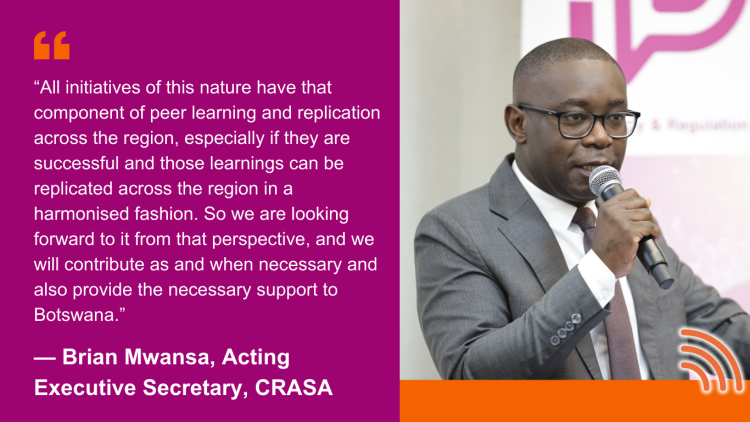
The week opened with a dynamic series of CI presentations from NRAs across Africa. The various countries presented their CIs relevant to nations, with discussions ranging from spectrum roadmaps to AI policy readiness, consumer protection, community networks, and satellite regulation. A complete spectrum roadmap for 2025-2035 that would bring together scattered policies and improve future-readiness was presented by Edem Debrah of Ghana. Kenya discussed its plan to help community networks reach marginalised areas, with Thomas Luti highlighting, “community networks… are for the people, run by the communities for their own benefit.” Lesotho highlighted the need to regulate AI and emerging technologies, with Alex Maama stating, “The LCA will… proactively work on the required policy to regulate emerging technologies for the good of the country effectively.”

Malawi, The Gambia, and Botswana regulators also shared CIs on spectrum initiatives related to quality of service enforcement, spectrum management, Public Key Infrastructure (PKI), and satellite services regulation. SPIDER’s Edna Soomre grounded the day’s work with a reminder of the programme’s purpose: “We want to drive you to the results of your change initiatives. You have the answers because you know the context.”
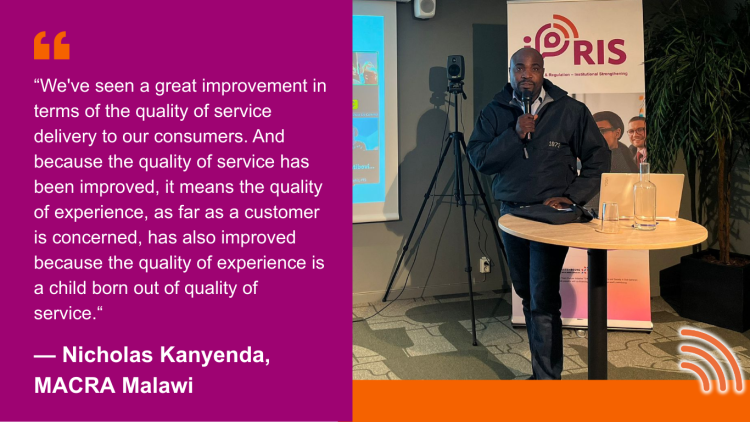
Tuesday’s sessions provided a deep dive into regulatory models, project structures, and the legal foundations of independence and cooperation in Europe. Alexandra Högberg opened with a project management masterclass on intentional design, reminding participants: “Clarity of purpose is what keeps a project anchored when everything around it shifts.” Lars Gustafsson charted Sweden’s evolution from a monopoly environment to a competitive, high-performing telecom market. His session showed how regulatory frameworks must evolve in tandem with market dynamics, spectrum demands and technological change.
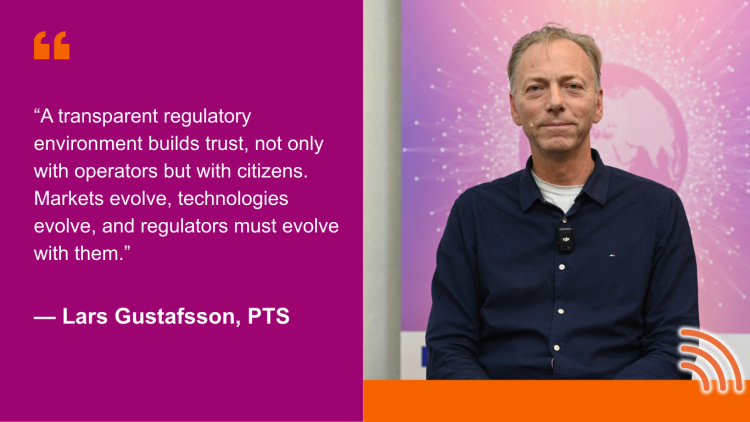
Per Andersson unpacked the legal foundations of the Joint European Offer, explaining Sweden’s constitutional separation between ministries and NRAs. His discussion illustrated why independence, transparency and legal certainty are necessary safeguards for credible regulatory practice. Building on this, Antonia Wopenka introduced the European Electronic Communications Code and emerging EU instruments, including the Gigabit Infrastructure Act and AI regulation. She highlighted how harmonised rules and regional cooperation equip regulators to navigate cross-border markets and fast-moving technologies.
These sessions clarified how legal certainty, transparency, resourcing, and institutional design underpin effective regulation, offering lessons for African NRAs working to strengthen their own frameworks.
Wednesday’s programme focused on the technical backbone of digital transformation: broadband deployment, mapping, and secure communications. Andreas Wigren opened with a look at Sweden’s broadband journey, demonstrating how clear targets and coordinated investment can drive long-term digital infrastructure. “State support works best when it complements the market, not replaces it,” he explained. Jens Ingman followed with a practical session on broadband mapping, stressing the centrality of reliable data: “Good mapping is the basis for good decisions. Without accurate data, you can neither plan nor regulate effectively.”
African regulators contributed national perspectives, from Ghana’s challenges with commercial viability to Malawi’s interest in demand-prediction tools, highlighting shared challenges and opportunities. An afternoon visit to the PTS headquarters introduced participants to Sweden’s secure communications frameworks, complemented by an evening reception that strengthened cross-continental professional bonds. The secure communications session was delivered by Per Erik Vitasp, Gustav Söderlind, and Joakim Aspengren, providing insight into Sweden’s approach to network resilience, emergency communications, and institutional coordination.
Thursday brought the focus to the user-facing side of regulation, ensuring that digital markets are fair, inclusive and accessible. The morning opened with Lisa Gurner, who introduced Europe’s regulatory approach to end-user protection. She explained how transparency rules, switching procedures and preventive supervision support markets where users can clearly understand their rights and make informed choices. Her session also highlighted PTS’ collaboration with the Swedish Consumer Agency and the mechanisms used to protect vulnerable groups. She was followed by Hans von Axelson, who explored digital inclusion and the practical ways accessibility is embedded into Sweden’s regulatory and service frameworks. By walking participants through procurement requirements, relay and interpretation services and real-time text systems, he demonstrated how inclusive design ensures that persons with disabilities can communicate on equal terms.
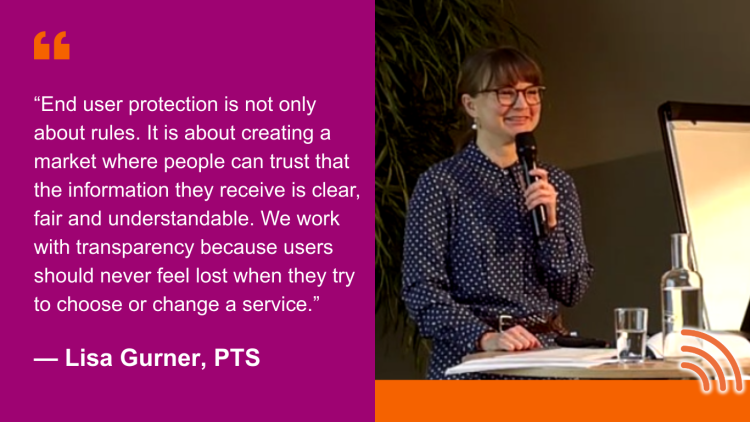
In the afternoon, Claes Hultholm and Jesper Simons provided a detailed look at Sweden’s numbering and addressing systems. They explained how national numbering plans are structured, how PTS allocates and supervises resources and why reclaiming unused numbers is essential for long-term sustainability. Their discussion also covered portability, emergency call obligations and the increasing need for expanded numbering ranges as digital services grow. Contributions from African NRAs highlighted parallels with challenges back home, including number shortages, fraud prevention and the need for more transparent allocation systems. The sessions demonstrated how user protections, digital accessibility and numbering frameworks collectively shape secure, inclusive and well-functioning communications markets.
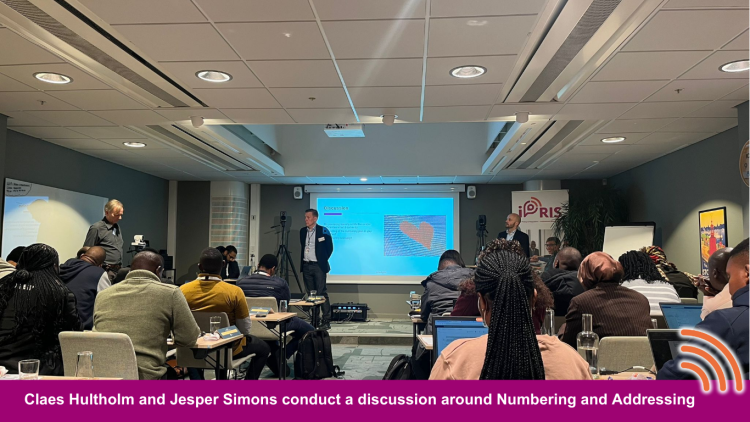
The week will conclude with a forward-looking agenda curated by PTS and SPIDER, focusing on future regulatory trends, spectrum management, and advanced project management. Bo Andersson will open the day by exploring how markets, technologies, and regulatory frameworks are evolving simultaneously. Amela Hatibovic, Gustav Lenninger, and Fredrik Johansson will lead Spectrum Management. This session aims to equip NRAs with practical insights into European spectrum allocation models.
SPIDER’s Alexandra Högberg & Malena Liedholm Ndounou will also deliver a hands-on workshop to refine the cohort’s Change Initiatives, ensuring they are realistically scoped, linked to impact pathways, and supported by strong indicators. The day will close with a cohort evaluation and a cultural visit to Stockholm’s Royal Palace, an opportunity to reflect on learning, celebrate progress, and strengthen relationships before Week 2.
Week 1 set a powerful foundation for the Seventh iPRIS Cohort, combining peer learning, European regulatory insights, and the practical shaping of Change Initiatives that respond directly to national needs. The balanced mix of technical sessions, legal frameworks, project management guidance, and cross-continental collaboration reflects iPRIS’s core mission: strengthening regulatory institutions and accelerating Africa’s digital transformation. As this cycle continues into Weeks 2 and 3, the cohort carries forward a shared commitment to building inclusive, secure, resilient digital ecosystems across the continent.
iPRIS is coordinated and implemented by SPIDER in strategic and technical partnership with the Swedish Post and Telecom Authority (PTS) and Institut luxembourgeois de régulation (ILR), as well as ARTAC, CRASA, EACO, and WATRA.
iPRIS is funded by the European Union, Sweden, and Luxembourg as part of the Team Europe Initiative “D4D for Digital Economy and Society in Sub-Saharan Africa” (Code: 001).
The iPRIS project turns two this November! The seventh iPRIS cohort will mark a significant milestone in the peer-to-peer capacity-building programme targeting telecom regulators across 43 countries.
This cohort will meet in Stockholm, Sweden, from November 16 to December 3, 2025, for their first phase in the project. The delegates will include telecom regulators from Botswana, Ghana, Kenya, Lesotho, Malawi, The Gambia, and Sweden. They will also be joined by other African ICT experts from regional regulatory organisations (RROs): the East African Communications Organisation (EACO), the Communications Regulators’ Association of Southern Africa (CRASA), and the West Africa Telecommunications Regulators Assembly (WATRA), who will share lessons from regional cooperation frameworks. All these participants will collaborate and engage in meaningful discussions across the three weeks to improve institutional capacity, regulatory cooperation, and inclusive digital development.
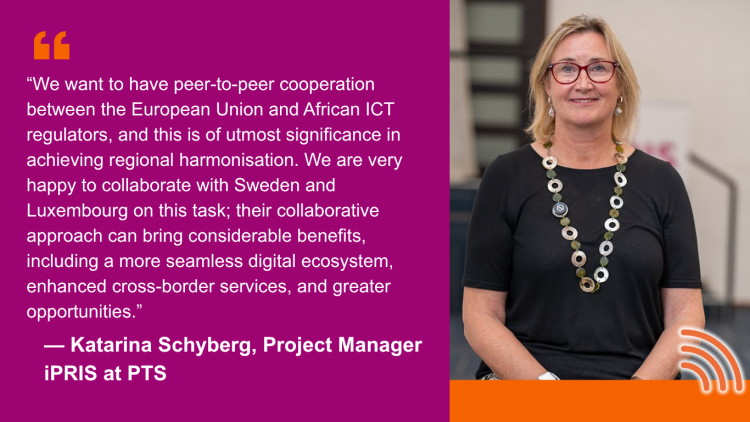
Since its inception in November 2023, the iPRIS programme has evolved into a dynamic platform for peer learning and regional cooperation. To date, it has supported over 120 telecom regulators across 31 African countries, advancing inclusive, evidence-based approaches to ICT policy and regulation.
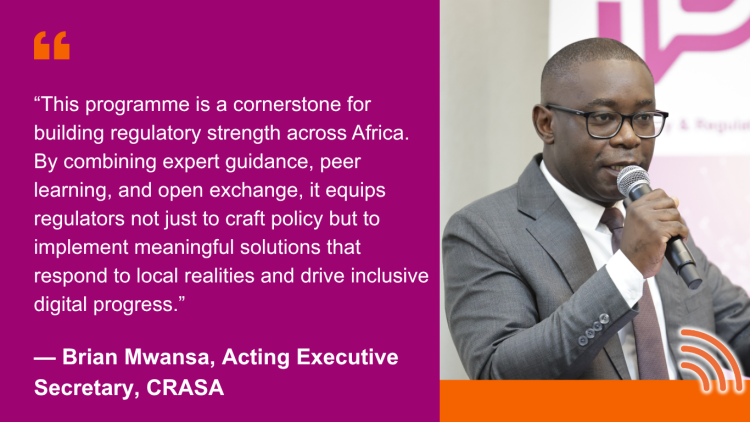
So far, iPRIS has engaged 31 NRAs across Sub-Saharan Africa, including:
Benin, Burundi, Cameroun, Central African Republic, Chad, Comoros, Congo-Brazzaville, Democratic Republic of the Congo, Eswatini, Gabon, The Gambia, Ghana, Kenya, Lesotho, Liberia, Malawi, Mauritania, Mauritius, Namibia, Nigeria, Rwanda, Senegal, Sierra Leone, South Africa, South Sudan, Tanzania, Togo, Uganda, Zambia, Zimbabwe, and Equatorial Guinea.
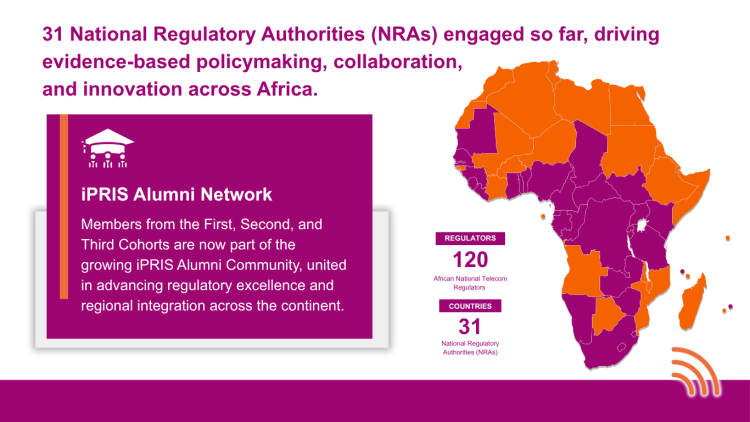
The incoming countries joining the seventh cohort will bring this number to 32 countries, reflecting the programme’s expanding footprint and its growing community of regulators committed to strengthening Africa’s digital future. Through its collaborative model, iPRIS has engaged more than 200 telecom experts from Africa and Europe, fostering continuous exchange between National Regulatory Authorities (NRAs), Regional Regulatory Organisations (RROs), and European partners. This growing network continues to strengthen institutional leadership, improve policy coherence, and bridge regional divides in digital governance. Each cohort contributes to a broader ecosystem of knowledge, where African regulators share best practices, pilot reforms, and build sustainable partnerships that collectively accelerate the continent’s digital transformation.
Below is a snapshot of some of the telecom experts and regulators that have been part of the journey so far


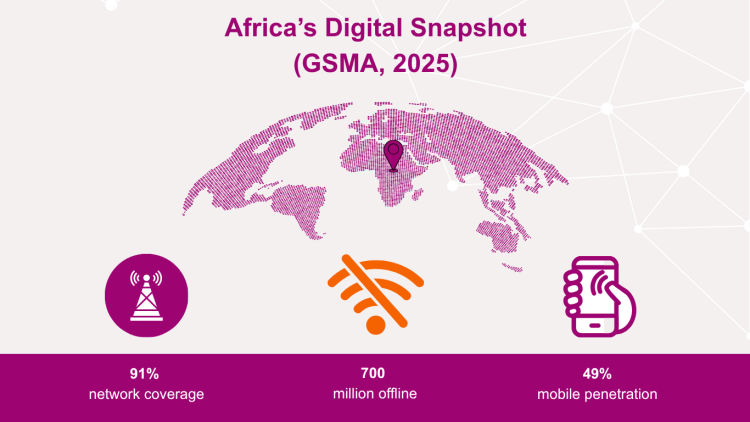
The impact is already visible. In Tanzania, regulators pioneered Direct-to-Mobile Satellite Guidelines, extending connectivity to remote areas. In Mozambique, a Change Initiative grew into a national roaming regulation that allows rural families to remain connected even when one network fails. In Mauritius, regulators are safeguarding the digital ecosystem with new Cybersecurity Guidelines, strengthening trust in online platforms, and preparing for a 5G-driven future. Uganda has stepped onto the global stage by hosting the ITU Global Symposium for Regulators (GSR 2024), bringing 900 delegates to Kampala and demonstrating Sub-Saharan Africa’s leadership in digital governance.
These milestones are the result of collaborative efforts across governments, regulators, development partners, and regional bodies. iPRIS is proud to have contributed as part of this wider community, driving digital transformation.
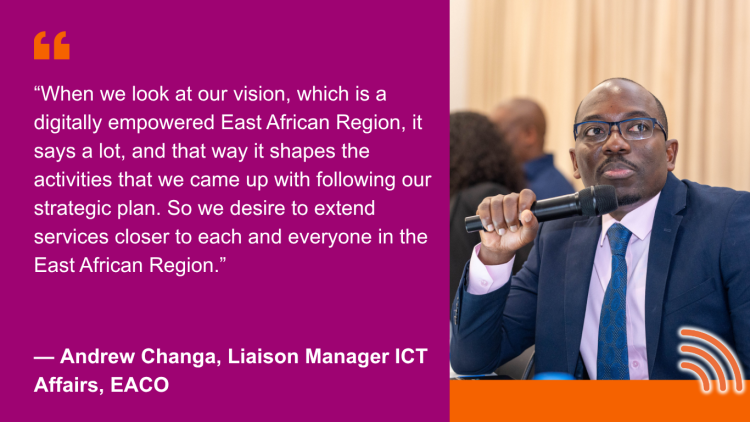
At WATRA, a number of initiatives are ongoing, most of which have yielded results towards providing meaningful connectivity in the sub-region, and some of these initiatives include;
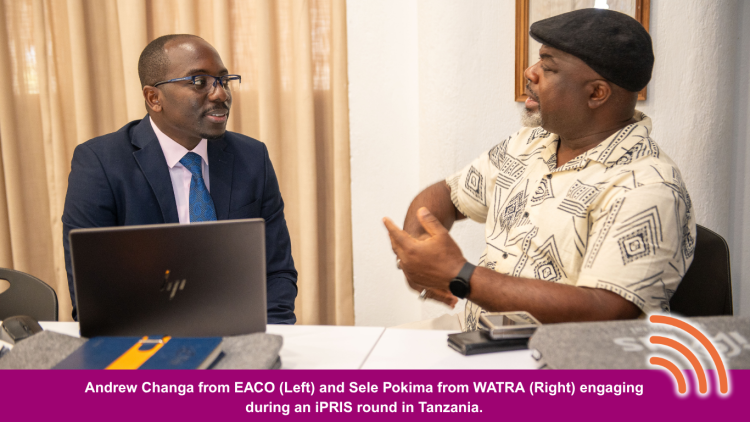
WATRA is also proud to play an active role in achieving the Digital Transformation Strategy (DTS) 2020 – 2030 for Africa, ensuring meaningful connectivity across all levels of the continent from the first to the last mile. Through the iPRIS project as well, various initiatives have been developed to promote connectivity across the sub-region, tackling critical areas of the telecommunications sector, including spectrum management and 5G deployment. With other key collaborations with the ITU, Smart Africa, and other development partners, WATRA is making strides towards ensuring meaningful connectivity across West Africa and Africa at large.
Access to 5G now reaches half the globe, but millions remain disconnected
According to the Sustainable Development Goals Report 2025 — marking the tenth annual stocktake of global progress toward the 2030 Agenda — the world stands at a critical juncture. With only five years left to achieve the SDGs, the report delivers a stark assessment: while millions of lives have improved, the pace of change remains insufficient to meet all 17 Goals by 2030. The report underscores that the Goals remain within reach only if action accelerates now. Across the world, young people, communities, civil society, and local leaders are driving efforts to deliver on the SDG promise. Connectivity is a key part of this global push. Although 5G coverage expanded to reach 51% of the world’s population by 2024, just five years after its commercial debut, progress remains deeply uneven. Eighty-four per cent of people in high-income countries have access to 5G, compared with only 4 per cent in low-income nations.
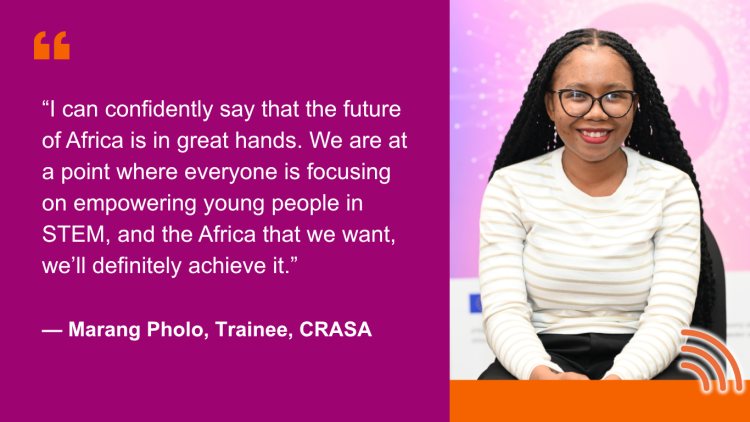
Watch the video below to learn more as Mugisha Bisanda, the Chief Technology Officer at Ericsson Tanzania, explores how operators can invest in fixed wireless access to expand 5G coverage to homes and businesses:
Where 5G is unavailable, 4G remains a vital alternative, covering 92% of the global population. Yet in low-income countries, 4G reaches just 52%, leaving 3G as the primary means of Internet access for many. Alarmingly, 4% of the world’s population remains entirely beyond mobile broadband coverage, with the largest gaps in Oceania (excluding Australia and New Zealand), where 24% have no access at all. The world’s Least Developed Countries (LDCs) and Landlocked Developing Countries (LLDCs) face similar challenges — 15% and 14% of their populations, respectively, lack mobile broadband access. These disparities highlight the urgent need for inclusive digital transformation and targeted investment to ensure that no one — or community — is left behind in the digital age.
This incoming phase offers attending participants a comprehensive mix of expert-led sessions, collaborative project work, and field visits that connect theory with practical insights. The discussions will revolve around these components:
Throughout the period, each NRA will continue to improve its Change Initiative, a national reform plan aimed at strengthening institutional performance and making the regulatory environment sustainable and inclusive.
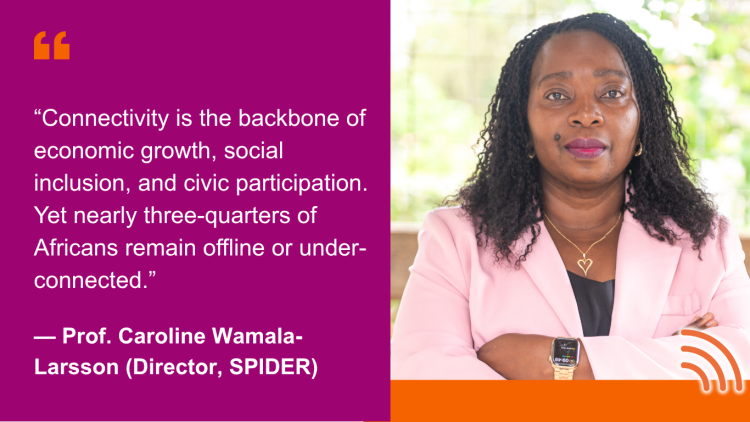
Read about the iPRIS sixth cohort sessions in Luxembourg here
As iPRIS turns two, its growing network of alumni and active cohorts reflects the programme’s sustained commitment to strengthening ICT regulation across Africa. To date, three cohorts have completed the iPRIS cycle, welcoming them into the alumni network, representing Anglophone and Francophone regions. The seventh cohort, meeting in Stockholm soon, continues this legacy of collaboration and peer learning. The number of Francophone cohorts that have participated in the iPRIS project are two, with more expected to join in the coming years. Claudio Bacigalupi, Head of Cooperation at European Union Delegation to Zambia and COMESA, highlighted the importance of collaboration in achieving regional harmonisation and creating a more conducive environment for innovation, investment, and cross-border digital services.
In 2026, iPRIS will expand its reach further through dedicated Portuguese-speaking rounds, designed to strengthen regional inclusion and linguistic diversity in digital policy dialogue. By the end of the project in 2028, iPRIS is expected to have trained over 300 African telecom regulators from 43 National Regulatory Authorities (NRAs) in designing and implementing evidence-based reforms for sustainable digital development.
Read about the first Francophone cohort here
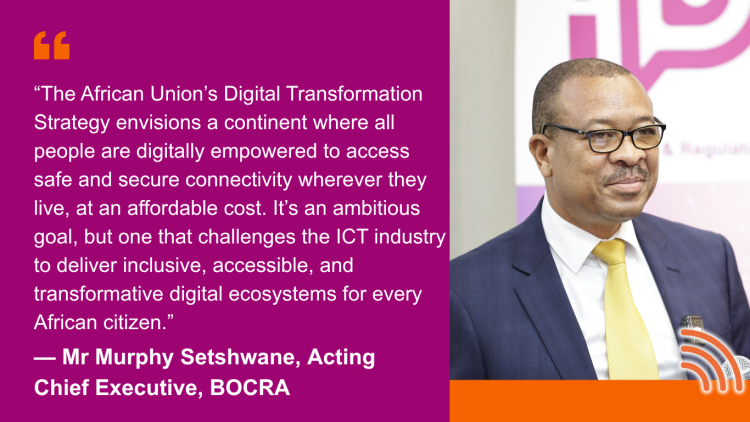
As this incoming cohort’s convening concludes in early December, participants will present their “Way Forward” project plans — strategic roadmaps for implementing regulatory reforms in their respective countries — supported by their RROs. This collaboration between African and European telecom experts continues to demonstrate how shared learning and partnership can strengthen institutional capacity, advance digital inclusion, and accelerate Africa’s transformation toward a connected, sustainable future.
Follow the journey of the seventh iPRIS cohort and their Change Initiatives on the iPRIS LinkedIn page as they translate global insights into national impact across Africa’s digital landscape.
iPRIS is coordinated and implemented by SPIDER in strategic and technical partnership with the Swedish Post and Telecom Authority (PTS) and Institut luxembourgeois de régulation (ILR), as well as ARTAC, CRASA, EACO, and WATRA.
iPRIS is funded by the European Union, Sweden, and Luxembourg as part of the Team Europe Initiative “D4D for Digital Economy and Society in Sub-Saharan Africa” (Code: 001).
The first Francophone iPRIS cohort, after a year of capacity building, collaboration, and peer learning, concluded their journey with a reflective and inspiring wrap-up session held online in October 2025. This milestone was a major progress in the iPRIS mission to support inclusiveness and regional cooperation in Africa's regulatory landscape. While the session marked the conclusion of their iPRIS journey, it simultaneously paved the way for new and continued interactions among the alumni. This cohort first met in Luxembourg for their European phase in 2024, during which they shared telecom insights with their European peers.

Since its inception in November 2023, iPRIS has supported over 120 regulators across 31 African countries, advancing inclusive, evidence-based approaches to ICT regulation. Over 200 telecom experts from across Africa and Europe are currently engaged in the iPRIS peer-to-peer capacity-building cycle. They are playing a vital role in expanding ICT access, fostering innovation, and unlocking development potential in their countries. Mobile internet penetration across Sub-Saharan Africa increased by 27%, according to GSMA, 2024. The cohort’s wrap-up plenary brought together national regulatory authorities (NRAs) from Chad (ARCEP), Mauritania (ARE), the Central African Republic (ARTP), Comoros (ANRTIC), ARPCE Congo-Brazzaville, and Senegal (ARTP), alongside regional bodies such as ARTAO and ARCEP France, and the SPIDER team. The session also included contributions from the Mauritanian national statistics agency (ANSADE) and representatives from Institut luxembourgeois de régulation (ILR).
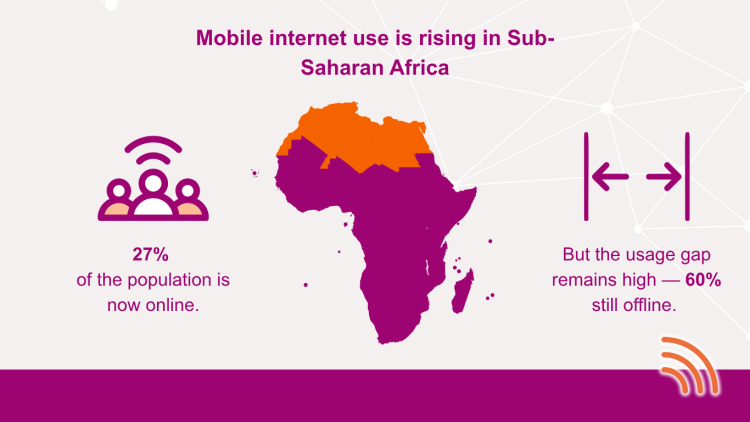
The plenary commenced with introductions from the facilitators, among them Malena Liedholm, Aminata Ndiaye, and Edna Soomre from SPIDER, and Tantely Jeans from ILR, who thanked the participants and the cohort for their year-long commitment. Caroline Wamala, Director of SPIDER, delivered the opening remarks, noting that the cohort’s participation and development were highly valued. She shared the experience of the year as one of common enlightenment and institutional bravery. She also stressed that the Francophone extension of iPRIS was not just a linguistic achievement but a strategic action that would lead to more profound regional inclusion. The session was a time for participants to reflect, appreciate, and reaffirm their commitment; by doing so, the cohort’s successes were linked to the larger iPRIS goal of using evidence-based regulation for all in Africa.
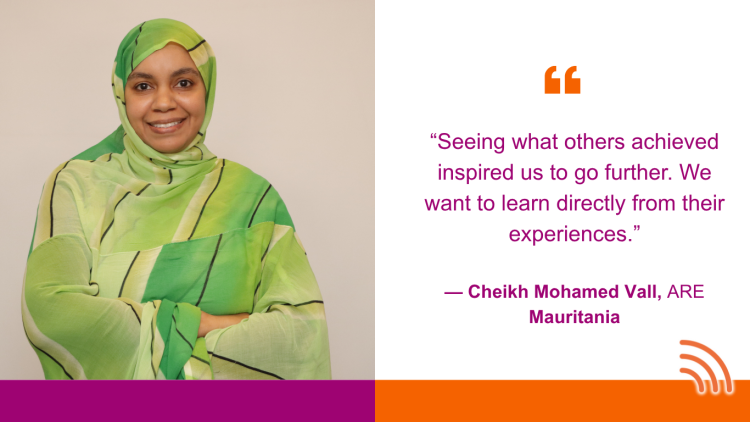
All the countries that presented their Change Initiatives did so with clarity and purpose, thus revealing the diversity of the regulatory priorities and institutional contexts. ARCEP Chad introduced revisions to the national numbering plan and drafted new regulatory documents to increase transparency and improve cash flow in the sector.
ARE of Mauritania presented its step-by-step plan to create a marketplace observatory. The undertaking comprised gathering data, obtaining regulators’ consent, and training employees, with particular focus on automated workflows and index unification. The team mentioned the study tours to acquire knowledge from other regulators, for instance, the one in Senegal, which focused on Excel-based data consolidation tools.
In the Central African Republic, the project aimed to improve internal data management and ensure compliance with regional standards. The team was optimistic about the future implementation of the changes. The Comoros Islands were cited as an example of a country that has consistently participated in the project and, although the details of their CI were not elaborated on during the session, their continued attendance remained a clear indication of the government’s commitment and the project’s momentum.
Senegal and Togo were referenced as contributors to peer learning, with Senegal’s technical approach cited as a model for replication. The exchange of tools, templates, and methodologies across countries reinforced the regional relevance of each initiative and demonstrated how shared challenges could be addressed through collaboration.
During the presentations, a consensus emerged, and a common thread of themes ran through them. Regulators aimed to fortify internal governance, enhance data quality, and, lastly, improve their capacity. The projects were based on real-world scenarios, ranging from legal frameworks to technical systems, and they demonstrated a common dedication to evidence-based policy-making.
Reflections from peers and experts
Facilitators and experts praised the cohort’s clarity, ambition, and institutional insight. Mr Rufus Samuel from ARTAO noted that without reliable data, regulators risk falling behind the market, and he emphasised that these initiatives are not just technical; they are foundational. ARCEP France encouraged collaboration with national statistics agencies to strengthen data credibility and coherence, citing their own experience with the National Institute of Statistics and Economic Studies (INSEE) as a valuable precedent.
“What we’ve learned here isn’t just technical. It’s a new way of collaborating, sharing, and building together.” Mariam Brahim Abdou ARCEP Chad
The participants' voices came together in unison, expressing the same thoughts. All of them pointed out that the true transformation is a very long process and requires not only patience, vision, and strategic partnerships but also projects like iPRIS, which made available to them both the tools and a network to support the progress. Representatives of the NRAs pointed out that working with colleagues from other jurisdictions not only allowed them to realise that they were having the same difficulties, but also taught them that the essence of regulation is trust, transparency, and co-development.
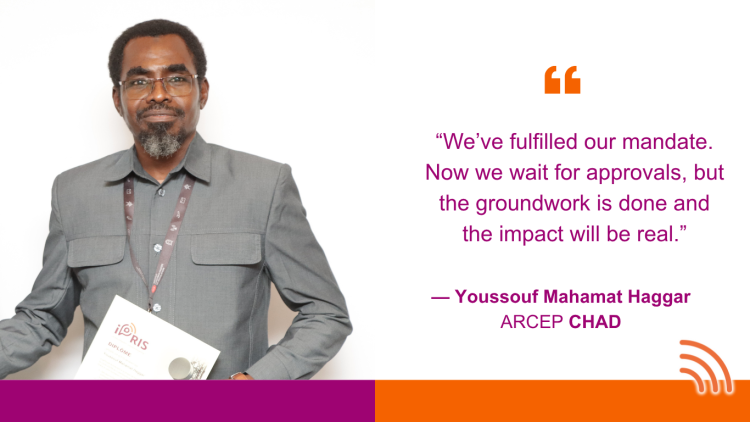
Looking ahead
This initial French group has now become part of the iPRIS alumni network, and there are still plans for engagement through mentorship, peer exchanges, and regional dialogues. The extension to French-speaking countries reinforces iPRIS's pan-African reach and facilitates knowledge sharing across languages in the field of digital regulation. The first group of French-speaking participants not only underwent a year of transformative learning but also set the stage for broader, stronger cooperation in ICT regulation. Their accomplishments indicate the influence of peer learning and the potential for institutional change. As the project evolves, iPRIS continues to support evidence-based, inclusive, and future-ready regulation in Africa.
Watch highlights from the 2024B iPRIS journey below
iPRIS is coordinated and implemented by SPIDER in strategic and technical partnership with the Swedish Post and Telecom Authority (PTS) and Institut luxembourgeois de régulation (ILR), as well as ARTAC, CRASA, EACO, and WATRA.
iPRIS is funded by the European Union, Sweden, and Luxembourg as part of the Team Europe Initiative “D4D for Digital Economy and Society in Sub-Saharan Africa” (Code: 001).
The African continent’s digital transformation journey was the subject of a high-profile debate at CNBC Africa where two of iPRIS’ voices were featured. With Edna Soomre, Head of Partnerships, Innovation and Digital Health at SPIDER, Project Lead for iPRIS and Trilok Dabeesing, Director of Information Technology at the Information and Communication Technologies Authority (ICTA) in Mauritius, the two connected in a discussion that was enlightening and insightful. The conversation reinforced the point that Africa has a digital future full of challenges and opportunities, and iPRIS is a main player in the change that is taking place.
Africa’s ICT moment: Progress with persistent gaps
Soomre pointed out that Africa is pulling up its weight as a digital leader, with the investment of the regulators and regional players in the ICT sector’s transformation being the driving factor. Still, a large pool of nearly 60% of the Africans are disconnected, although the places where they live are close to the infrastructure. “What we see is a lack of trust in services, gaps in women’s access and affordability challenges,” she asserted, citing the fact that only 31% of African women use digital services as compared to 43% of their male counterparts. Partnerships are a must for Soomre: inclusion should not be left to the regulators alone; it should also involve international development actors, private sector partners, and the communities.
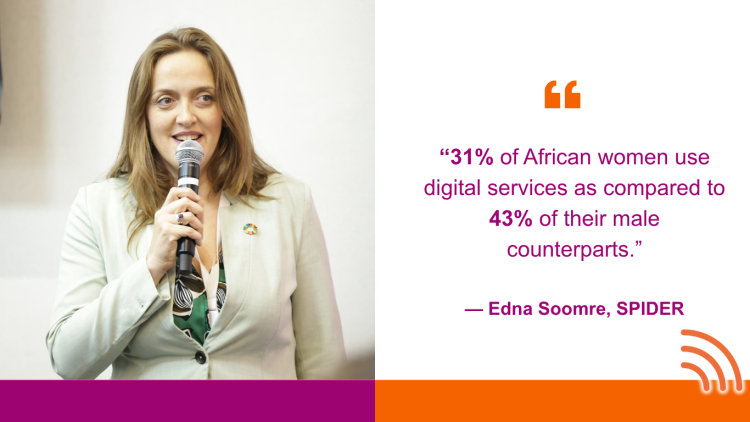
Mauritius as a case study: Lessons for the continent
Dabeesing from Mauritius discussed the country's highlights, including a mobile penetration rate of over 170%, effective e-government services, and its efforts to tap into fintech and digital trade. However, he noted that the African story has room for improvement. “In rural areas, the people’s chances of using mobile internet are three times lower than in cities,” he elaborated. The high cost of data is a significant factor that hinders the penetration of the Internet in Africa. It is estimated that the cost of 1 GB of data in Africa is approximately 3% of the user’s monthly salary, while the UN’s threshold is 2%. The situation with electricity is bleak, as 600 million Africans are still not connected to the electricity supply, which is a major hurdle to the uptake of ICTs.
Dabeesing stressed the impact of the iPRIS project: “The major upside of iPRIS is that it gives the regulators and the policy-makers not only the technical know-how but also the tools for ensuring diversity, equity, and inclusion, thus making the digital transformation process fair and affordable.”
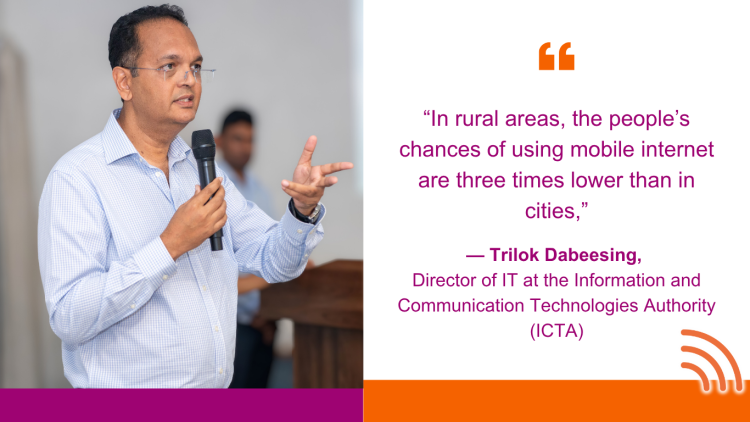
iPRIS as the primary driver of change
iPRIS is funded by the European Union, Sweden, and Luxembourg, and is reinforcing regulatory capacity in 43 countries in Sub-Saharan Africa with assistance from four African regional regulatory organisations (RROs). This program addresses various challenges through the National Regulatory Authorities’ (NRA) Change Initiatives, including affordability, digital illiteracy, and infrastructure gaps. Some of the activities in the Sub-Saharan region are strengthening the cybersecurity frameworks in Mauritius and advancing the possibilities of satellite connectivity in Tanzania.
Soomre pointed out the economic potential: “If communities living next to the border are afraid of roaming fees or do not trust the services, they will not be able to trade or do business. It is through regulatory innovation and cross-border cooperation that these opportunities will be unlocked.”
Youth and the digital economy
The people of Africa are its greatest asset, with the youth comprising the most significant part of the population, at almost 60%. The Youth are the very focus of the African Union’s Digital Transformation Strategy (2020-2030), and the IFC/Google report that Africa’s internet economy will grow to USD 180 billion by 2025 is a testimony to the youth being the key driver of the continent's growth.
To harness the digital potential of Africa, regulators will have to teach the public how to make the best use of technology, create an environment that is suitable for digital trade and steer the national plans in the direction of the continental strategies such as the African Continental Free Trade Area (AfCFTA) treaty.
The role of regulators in the future
The two speakers emphasised that the growth of the digital sector, which is accessible to all, cannot be achieved in isolation. RROs, such as ARTAC, EACO, WATRA, and CRASA, would need to closely collaborate with government ministries, academic institutions and the private sector.
“Through dialogue, we can together mobilise the youth into jobs, create new opportunities and minimise redundancy,” Soomre stressed.
This CNBC Africa interview pointed out both the advantages and the obstacles of Africa's digital future. iPRIS is advancing the digital advancement agenda in Sub-Saharan Africa by stressing inclusivity, trust, and understanding. These foundations will help connect underserved areas and nurture emerging digital ecosystems. Dabeesing stated that the digital transformation of Africa is in progress, but making it fair, inclusive, and sustainable will be the task of a united force consisting of regulators, policymakers, and partners that are working together in tandem.
Watch the full interview here: Driving investment in Africa’s ICT sector - CNBC Africa
iPRIS is coordinated and implemented by SPIDER in strategic and technical partnership with the Swedish Post and Telecom Authority (PTS) and Institut luxembourgeois de régulation (ILR), as well as ARTAC, CRASA, EACO, and WATRA.
iPRIS is funded by the European Union, Sweden, and Luxembourg as part of the Team Europe Initiative “D4D for Digital Economy and Society in Sub-Saharan Africa” (Code: 001).
- Gaborone
The iPRIS Africa Phase was held in Gaborone, Botswana, from 6 to 9 October 2025 for the project's fifth cohort. It marked the convening of six National Regulatory Authorities (NRAs) from Eswatini, Sierra Leone, Nigeria, Tanzania, Uganda, and Zambia, along with the Regional Regulatory Organisations [RROs] (CRASA, EACO, WATRA) and key iPRIS implementing partners from SPIDER and PTS. The Botswana Communications Regulatory Authority (BOCRA) hosted the meeting, marking a significant landmark in reinforcing institutional capacity and fostering region-wide collaboration in Africa’s digital policy and regulatory ecosystem.
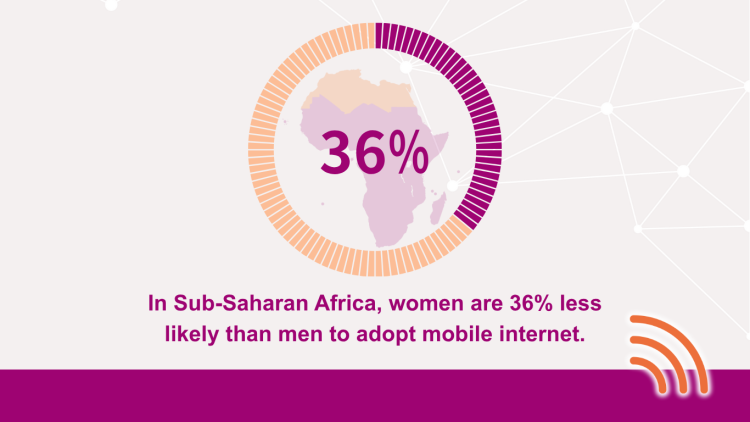
iPRIS has, from the very beginning in 2023, involved more than 30 NRAs from Sub-Saharan African countries in the project phases, providing them with support to improve their governance practices, collaborate more effectively, and create digital policies that are inclusive and reflect the specific conditions of their respective areas. This goal is crucial in a region where women are still 36% less likely to adopt mobile internet than men, and where digital exclusion is often a reflection of social inequalities (GSMA, 2025). iPRIS aims to tackle such issues by building regulatory capacity, promoting research-based regulations, and promoting gender-sensitive policies, thus ensuring that no one in Africa is left behind during the digital transformation process.
Read about the iPRIS fifth cohort's Europe phase in Sweden earlier this year here

On Day 1 in Botswana, Mr Murphy Setshwane, the Acting CEO of BOCRA, pointed out that harmonised and forward-looking regulation is essential for Africa’s sustainable digital future in his opening remarks. He referred to the African Union's Digital Transformation Strategy as a roadmap that will bring about the envisioned connectivity that is inclusive, affordable, and secure for all.
During this opening session, Mr Brian Mwansa from CRASA commended the initiative for its positive impact in the area of partnership among nations:

The European Union delegation also reiterated the importance of regional dialogues as a key component of the Team Europe D4D Initiative, which continues to invest in Africa's digital resilience and policy harmonisation. Edna Soomre, iPRIS Project Lead at SPIDER, highlighted the importance of iPRIS as not only a capacity-building but a collaborative platform where the regulators can exchange their experiences, highlight their advancements, and through the latter, gradually set the tone for the regulatory ecosystems that will be inclusive:
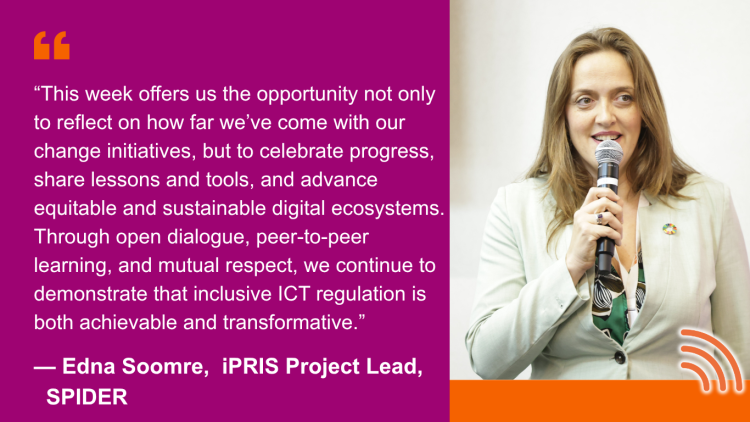
After the warm welcome, each NRA presented and reported on their Change Initiatives (CIs), setting the stage for exchanges among ICT experts, RROs, and the PTS team. The discussions served as a reminder of the cohort’s intention to move towards digital environments that are fair and sustainable across Africa.
The second day of the Botswana Follow-Up Phase facilitated an exchange between African regulators and international partners, where they drew practical lessons from European experiences and adapted them to the continent’s ever-changing and dynamic regulatory environment. The sessions, featuring experts from Telia AB, SPIDER, and PTS, explored the development of regulation in the open market, the critical importance of inclusivity, and the strategic foresight needed to address challenges arising from technological and demographic shifts.
Sofia Donner from Telia AB presented a historical viewpoint on the regulatory shift in Sweden from a state monopoly to a competitive market during the morning session. She explained how the regulators' thinking has evolved through different phases, from infrastructure expansion to consumer choice, and now emphasises security, resilience, and data protection. The session served as an eye-opener for regulators, highlighting the need to balance the competing demands of the market with accountability. It also underscored the importance of protecting public trust in digital services through the implementation of the three principles: transparency, consent, and lawful data handling.
She highlighted that “Telecom governance has moved beyond infrastructure and market dynamics. Today, regulators and operators must define their role in society by ensuring that communication systems serve public interest, national resilience, and inclusive development.”
Dr Caroline Wamala Larsson then took over the stage with a fascinating and insightful discussion on digital governance and inclusivity, supported by her fieldwork in Mozambique. She provided an example of how accessibility issues, ranging from inadequate infrastructure to cultural norms, can exacerbate the digital divide. The main point of her presentation was that inclusivity should not only be considered in the regulators’ designs but also in the infrastructure, planning and innovation policies. She also used iPRIS’s approach to argue that gender-responsive regulation is not a separate agenda but a very basic pillar of fair digital transformation.
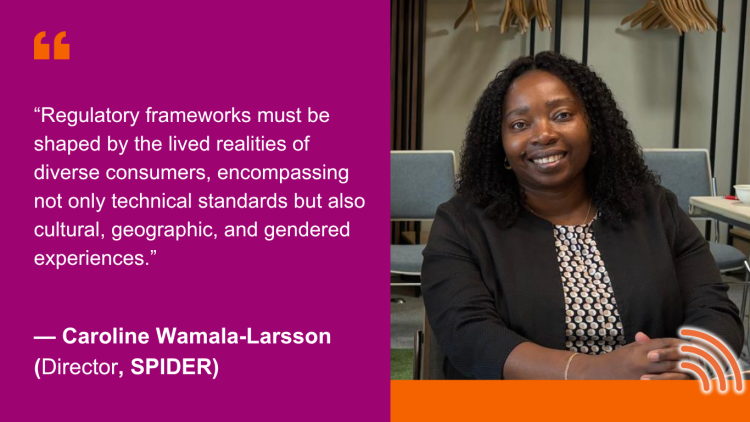
In the same vein, Kerstin Borglin and Katja Sarajeva reintroduced the basics of project management, which had been initially discussed in the European phase in Sweden. They encouraged the participants to improve their CIs with more precise definitions of outcomes, ownership, and sustainability. A number of regulators used this session to measure their progress, refine their implementation roadmaps, and thus guarantee that the iPRIS discussions will result in actual institutional results, in terms of being measurable.
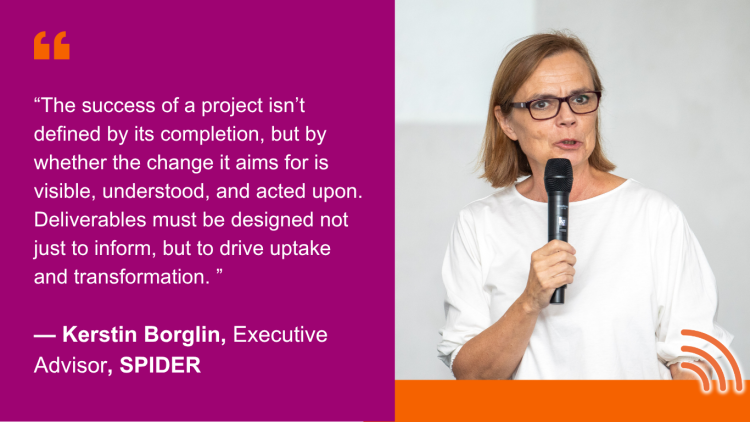
The day ended with Bengt Mölleryd, who advocated for strategic foresight as a tool for readiness. He offered participants a walkthrough of the techniques, such as horizon scanning, scenario planning, and visioning, the tools intended for regulators to be ahead in shifts of markets, demographics, and technology. His session encouraged participants to cultivate diverse perspectives within their institutions and to view foresight not as prediction, but as preparation for the unknown.
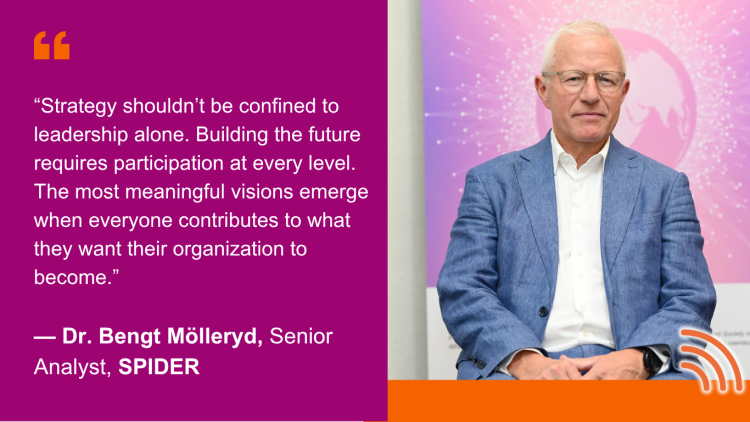
Peer learning and targeted collaboration marked the third day of the Botswana Follow-Up Phase, involving NRAs that worked closely with their respective RROs — CRASA, EACO, and WATRA — plus iPRIS coordinators from SPIDER and the PTS.
The day was structured around small group sessions, which allowed each NRA to deliver detailed presentations of their CIs to get personalised feedback and to hold discussions on practical ways to deal with the implementation challenge. This format led to more profound discussions about ways to measure country-level impacts of strategic plans. The RRO, SPIDER and PTS teams were instrumental in linking these conversations to the global regulatory practice; they steered the teams through the facets of institutional resilience, impact measurement, and long-term policy sustainability.
Here are a few photo highlights from the sessions:
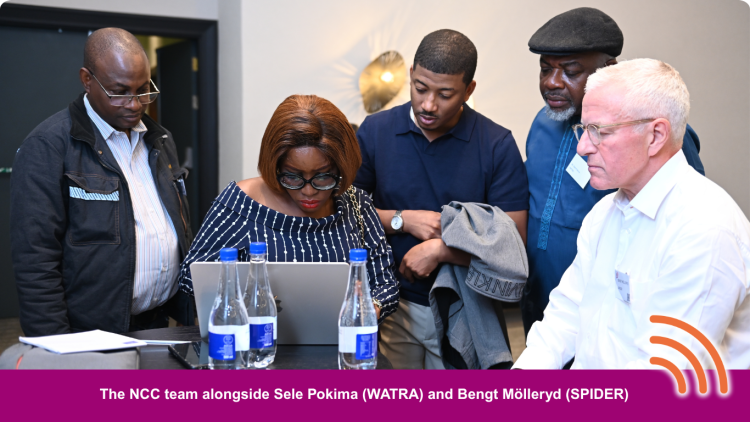
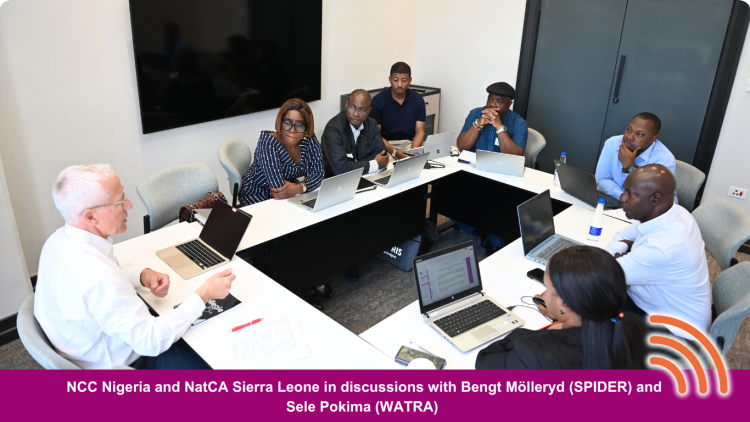
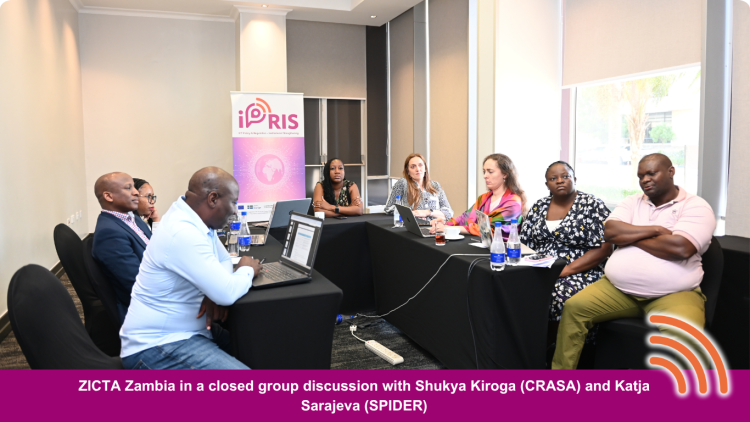
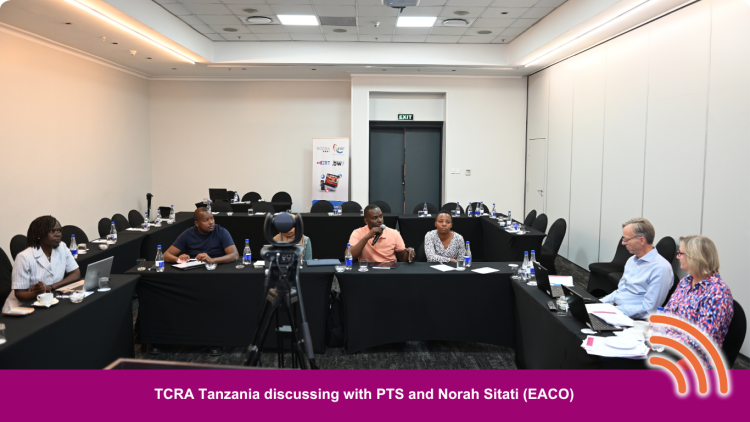
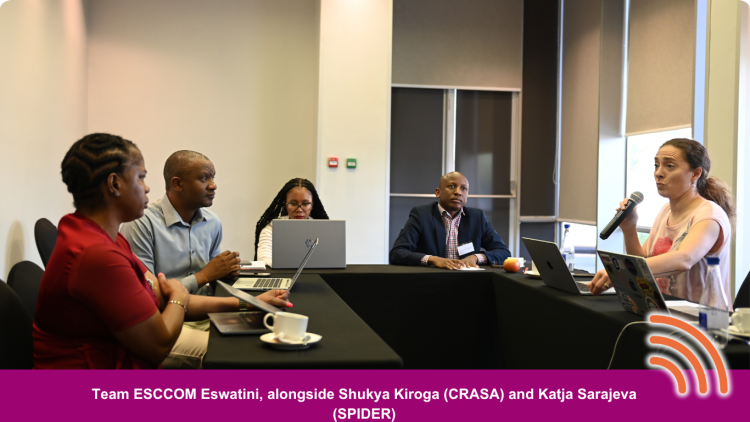
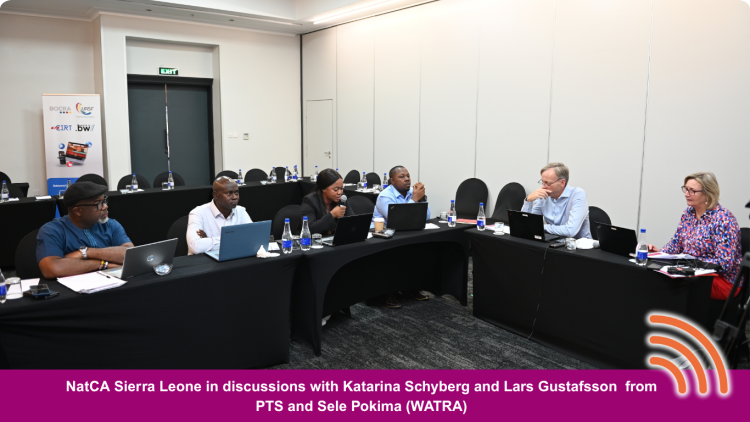
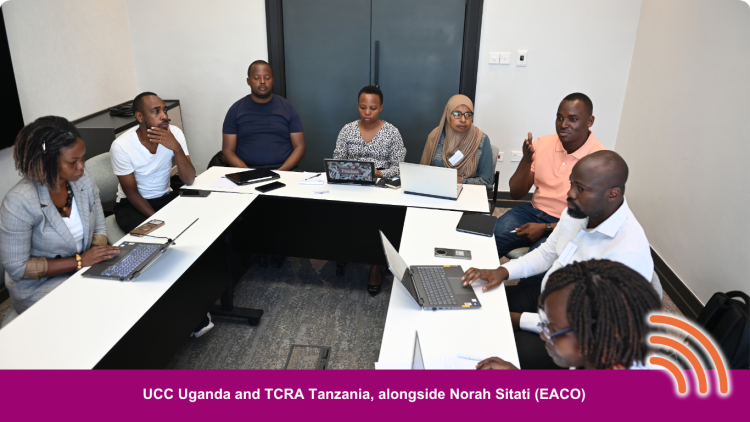
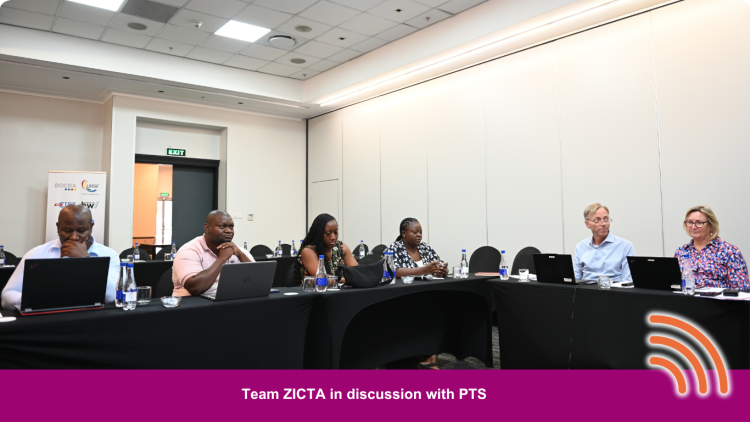
The morning session focused primarily on 5G and high-performing networks, which were regarded as the main factors driving the digital transformation in Africa. The experts from Ericsson discussed not only the evolution of the mobile network but also the significance of 5G in smart manufacturing and other sectors. They pointed out that Africa's young population is a plus, and if investments in policy, infrastructure, and skills development are made in time, the continent can witness a digital revolution.
Efosa Aigbe from Ericsson revealed that "Africa’s youth are accelerating technology adoption across the continent. By equipping them with digital skills and building high-performing networks, we’re laying the foundation for a new era of industrialisation and connectivity."
Meanwhile, the Nigerian Communications Commission, as a regulator, mentioned its national 5G policy, and the discussion also involved spectrum allocation, deployment costs, and the necessity of collaboration among the stakeholders. One of the points made repeatedly was that in Africa, connectivity is not just a service anymore but rather the base for industrial and social transformation.
The program then transitioned to the "Way Forward" sessions, which have become a hallmark of every iPRIS round. Each of the six regulators taking part showed the new versions of their Change Initiative (CI) roadmaps, discussed progress they had made since they started together and the stories that were drawn from interactions with peers. The discussions were characterised by openness, practicality, and collaboration and thus uncovered both the difficulties and the inventiveness of the teams involved. The day ended with shared moments at the Mokolodi Nature Reserve, as they continued to network with a shared goal grounded on trust and the idea of inclusive digital development.
View more highlights and reflections below:
iPRIS is coordinated and implemented by SPIDER in strategic and technical partnership with the Swedish Post and Telecom Authority (PTS) and Institut luxembourgeois de régulation (ILR), as well as ARTAC, CRASA, EACO, and WATRA.
iPRIS is funded by the European Union, Sweden, and Luxembourg as part of the Team Europe Initiative “D4D for Digital Economy and Society in Sub-Saharan Africa” (Code: 001).
The iPRIS Project will convene its fifth cohort's Africa Phase in Botswana from October 6 to 9. Over four days, National Regulatory Authorities (NRAs) and Regional Regulatory Organisations (RROs) will gather to advance ongoing Change Initiatives and deepen collaboration on some of the most pressing challenges shaping Africa’s digital future.
Representatives taking part will include those coming from the Eswatini Communications Commission (ESCCOM), the National Communications Authority of Sierra Leone (NatCA), Nigerian Communications Commission (NCC), Tanzania Communications Regulatory Authority (TCRA), Uganda Communications Commission (UCC), and Zambia Information and Communications Technology Authority (ZICTA). Additionally, the presence of RROs such as CRASA, WATRA, and EACO will emphasise that regional cooperation is paramount if regulatory transformation is to be realised.
This Africa phase aims to build momentum following the May Europe round, where the same cohort gathered to map out their Change Initiatives. In Botswana, the regulators will provide further updates on their change initiatives. At the same time, various peer-to-peer exchanges will be designed to enhance project management, refine policy responses, and promote the sustainability of institutional impacts.
During the Africa phase, NRAs in this region will particularly focus on four main themes:
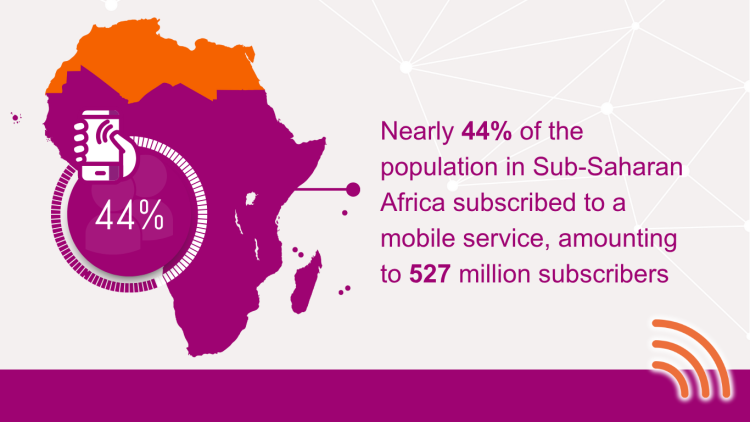
The discussions come at a pivotal time. According to the GSMA- State of Mobile Internet Connectivity Report 2024, sub-Saharan Africa which has one of the most youthful populations globally has more than half of adults aged 18+ still unconnected. By the end of 2023, nearly 44% of the population in Sub-Saharan Africa subscribed to a mobile service, amounting to 527 million subscribers (GSMA), reflecting both the potential and the infrastructure challenges regulators must address. Meanwhile, cross-border digital services, cybersecurity threats, and the need for harmonised frameworks place additional demands on NRAs.
By convening in Botswana, this delegation will continue to strengthen the role of iPRIS as a focal point for regulatory cooperation and advance the resolution of real issues useful in sustaining long-term capacity building. The result of these sessions will be national reforms, as well as a solid regional coordination framework vital to Africa's continued digital transformation.
iPRIS is coordinated and implemented by SPIDER in strategic and technical partnership with the Swedish Post and Telecom Authority (PTS) and Institut luxembourgeois de régulation (ILR), as well as ARTAC, CRASA, EACO, and WATRA.
iPRIS is funded by the European Union, Sweden, and Luxembourg as part of the Team Europe Initiative “D4D for Digital Economy and Society in Sub-Saharan Africa” (Code: 001).
Borgarfjordsgatan 12, Kista,SWEDEN
Postal Address: Stockholm University, Department of Computer and Systems Sciences/DSV, SPIDER, P.O Box 1073, SE-164 25 Kista, Sweden
Copyright © 2025 iPRIS. All rights reserved.